

How to Work on a Superyacht? (A Guide to Getting Started)

Have you ever dreamed of working on a superyacht and exploring the world’s most beautiful destinations? If you have, you’re not alone.
Working as a crew member on a luxury vessel is an exciting and rewarding career that can open up a world of possibilities.
In this guide, we’ll look at how to get started in this unique industry and what you need to know before signing on.
We’ll cover things like qualifications and experience, seafarers license and commercial vessel experience, working hours, flexibility and reliability, teamwork skills, job search strategies, and on-the-job training.
So, if you’re ready to embark on the journey of working on a superyacht, read on!
Table of Contents
Short Answer
Working on a superyacht typically requires a certain level of experience in the maritime industry.
Most positions require certification as a yacht professional, such as a deckhand, engineer, steward/ess, chef, or captain.
Depending on the job, you may also need additional qualifications, such as a Merchant Mariner’s Credential or other certifications.
Additionally, superyacht crew often need a valid passport, as they may need to travel internationally.
Qualifications and Experience
Working on a superyacht requires a variety of qualifications and experience.
Employers will look for experience and qualifications in areas such as mechanics, engineering, hospitality, and customer service.
Depending on the specific role desired, employers may also require a valid seafarer’s license and commercial vessel experience.
Furthermore, previous experience working on a superyacht may also be beneficial in securing a job.
For those interested in a technical role, employers may require qualifications and experience in marine engineering and mechanics.
Having experience with diesel engines, propulsion systems, and electrical systems may be beneficial.
Additionally, knowledge of onboard systems such as navigation, communication, and safety systems may be necessary.
For those interested in a hospitality role, employers may require experience in hospitality, customer service, and food service.
Having experience in restaurant operations, housekeeping, and customer service may be beneficial.
Additionally, knowledge of different cultures and languages may be beneficial for those interested in a hospitality role.
Finally, those interested in a superyacht career should be prepared for a team-oriented environment.
Working on a superyacht requires a strong sense of camaraderie and collaboration.
Those who have experience working in a team environment may be more desirable to employers.
Additionally, having a flexible schedule, reliability, and the ability to work in a fast-paced environment may be beneficial when applying for a position.
Seafarers License and Commercial Vessel Experience

Having a seafarer’s license and commercial vessel experience is essential for anyone interested in working on a superyacht.
A seafarer’s license is issued by the International Maritime Organization (IMO) and is required to legally operate a vessel.
The license is divided into several categories depending on the size and type of vessel the applicant intends to operate.
Additionally, the mariner must have the necessary experience to qualify for the license.
Experienced mariners may need to take a practical or written exam to demonstrate their proficiency.
Commercial vessel experience is also important for anyone looking to work on a superyacht.
This experience can be gained through working on other vessels, such as fishing boats, cargo ships, or cruise ships.
Working on these vessels gives the applicant an understanding of the maritime industry and the skills necessary to operate a vessel.
Additionally, many employers look for applicants with experience in the hospitality industry, as superyacht crew must provide a premium level of service.
Finally, it is important for potential superyacht crew to be familiar with the various safety protocols and regulations that are in place on superyachts.
Applicants should have a basic understanding of the International Safety Management (ISM) code and the International Ship and Port Facility Security (ISPS) code, which are both in place to ensure the safety of the vessel and its crew.
Additionally, having a valid first-aid certification is beneficial, as the crew may be required to respond to medical emergencies.
In conclusion, having a seafarer’s license and commercial vessel experience is essential for anyone interested in working on a superyacht.
Additionally, understanding the various safety protocols and regulations in place on superyachts is important for any potential applicant.
Finally, having experience in the hospitality industry is beneficial, as superyacht crew must provide a premium level of service to their guests.
Working Hours
For those looking to start a career on a superyacht, it is important to understand the unique working hours associated with this job.
As superyachts are often in use for extended periods of time, the hours can be unpredictable and demanding.
In general, the working hours on a superyacht will range from 8-12 hours per day, with the possibility of additional overtime.
When the yacht is in port, workers may be required to stay on board and work extended shifts.
It is not uncommon for crew members to work seven days a week, and in some cases, even longer.
Additionally, the working hours may vary depending on the season and the vessel’s itinerary.
Therefore, it is important that applicants be prepared to work long and unpredictable hours.
Flexibility and Reliability

When it comes to working on a superyacht, flexibility and reliability are key traits that employers look for in potential employees.
This is due to the fact that superyacht jobs often require working long hours, often in remote areas, and the ability to work in a team-oriented environment.
In order to be successful in this type of job, the successful applicant must be able to adapt to changing schedules, conditions, and environments.
This could include working at night or on weekends, dealing with different types of customers, and having to be prepared for anything that could come up.
Reliability is also an important quality for superyacht workers.
Employers need to know that their employees will show up on time and be able to handle any situation that comes up.
They also need to know that their employees will be able to follow instructions and take initiative when needed.
In order to demonstrate these qualities, applicants should be sure to have good references from past employers who can vouch for their ability to be flexible and reliable.
Additionally, having a valid seafarer’s license and commercial vessel experience can be beneficial in demonstrating these qualities.
Overall, having the qualities of flexibility and reliability is essential for anyone looking to work on a superyacht.
Employers want to know that their employees can handle whatever comes their way, and having these qualities is a surefire way to demonstrate that you have what it takes to be successful.
Teamwork Skills
Teamwork is one of the most important skills to have when working on a superyacht.
The crew of a superyacht is typically made up of a variety of specialists, all working together to ensure that the vessel is run smoothly and efficiently.
Successful crew members will need to be able to work together in a collaborative and positive manner, as well as take direction from supervisors.
This means that they must be able to communicate effectively, accept constructive criticism, and be comfortable working in an environment with diverse personalities.
Teamwork is also essential when it comes to completing tasks quickly and efficiently.
On a superyacht, time is often of the essence and the crew must be able to work together to accomplish tasks in an efficient manner.
This could include anything from cleaning and maintenance to food preparation and guest entertainment.
Working together as a cohesive unit is key to providing a successful, pleasurable experience for the guests.
Finally, teamwork skills also come into play when dealing with difficult situations.
Superyachts often encounter unexpected problems or emergencies, and the crew must be able to come together to quickly assess and address the issue.
Being able to think on your feet and work together harmoniously is essential in these scenarios.
In conclusion, having strong teamwork skills is essential when working on a superyacht.
Those interested in pursuing this career should focus on honing their communication, collaboration, and problem-solving skills in order to be successful.
Job Search Strategies

When it comes to finding a job on a superyacht, the most important thing is to have a thorough understanding of the industry and the type of position you are looking for.
Researching the different types of vessels, the types of jobs available, and the qualifications and experience required to work on them is essential.
You should also familiarize yourself with the different certifications and licenses required for different positions, such as a valid seafarer’s license and commercial vessel experience.
Networking is also an important part of the job search process.
Joining industry-specific professional organizations and attending yacht shows and other industry events can help you connect with potential employers and learn more about the industry.
Additionally, it is important to stay up to date on the latest industry news and trends, as this can help you stay informed and competitive.
When applying for a superyacht job, it is important to be prepared.
Having a well-written and comprehensive resume that highlights your relevant skills and experience is essential.
Additionally, having a portfolio of your work can also be beneficial.
Finally, it is important to be prepared for the interview process, as this will be the employer’s chance to get to know you better and determine if you are the right fit for the job.
On-the-Job Training
Working on a superyacht requires a variety of skills, from technical and mechanical abilities to hospitality and customer service.
As such, on-the-job training is often necessary to ensure that the successful applicant is well-versed in the necessary duties.
On-the-job training can take place in a variety of settings, including onboard the yacht itself or in a classroom setting.
During this training, the applicant will learn the basics of the industry, such as vessel maintenance, safety protocols, and customer service skills.
Additionally, they will be taught how to handle various types of emergencies that may arise while they are on board.
Finally, they will be given an overview of the social etiquette and protocols that should be followed while working on a superyacht.
By the end of the training period, the applicant should have a clear understanding of the job duties expected of them and be ready to begin working.
Final Thoughts
Working on a superyacht can be an incredibly rewarding career choice for those interested in the yachting lifestyle.
To ensure success and create the best possible experience for employers and guests alike, it is important to have a solid understanding of the industry, qualifications and experience, a valid seafarer’s license and commercial vessel experience, and the flexibility and reliability to work long hours in a team-oriented environment.
With the right preparation and a commitment to hard work, anyone can be successful in this unique career.
So what are you waiting for? Start your journey to the high seas and begin pursuing your dream job today!
James Frami
At the age of 15, he and four other friends from his neighborhood constructed their first boat. He has been sailing for almost 30 years and has a wealth of knowledge that he wants to share with others.
Recent Posts
Does Your Boat License Expire? Here's What You Need to Know
Are you a boat owner looking to stay up-to-date on your license requirements? If so, youve come to the right place! In this article, well cover everything you need to know about boat license...
How to Put Skins on Your Boat in Sea of Thieves? (Complete Guide)
There is a unique sense of pride and accomplishment when you show off a boat you customized to your exact specifications. With Sea of Thieves, you can customize your boat to make it look like your...
Seeker is the social platform to find and share the places you love.
0 Places . 0 Trips and Guides.
Please enter your email
- Seeker for Brands
- Become a Brand Ambassador
- Let’s connect
New to Seeker? Join for free
Already have an account? Login
Working on Superyachts: Our Guide to Getting Paid and Traveling the World
Sustainable travel expert, adventure seeker
Jakobstad, Finland
Throughout m y ten years as a superyacht stewardess, people have been intrigued by the job and what they imagine it entails. Admittedly, I have worked for celebrities and visited places I doubt I would’ve seen if it weren’t for the job. However, being repeatedly woken by the steward’s buzzer and requests to “make the engines less noisy” is infuriating, even when it’s at the behest of one of the world’s most famous drummers. And guess what? A visit to Mustique is a lot less paradisiacal when you have to spend your one hour ashore frantically trying to find a blind masseuse and a case of vintage rosé.
As a seasoned yachtie, I can tell you all about the pros and cons of this much-lusted over job. Read on and find out if a life below decks could be the life for you.
You’ll earn the kind of cash that can buy you a house

Become a yachtie and you’ll see a fat paycheck and your bank balance balloon as you start to earn the big bucks. We’re talking average monthly salaries starting around 3,000 Euro. If that doesn’t sound like a lot, keep in mind that you’ll have all of your expenses (everything from toothpaste to health insurance) conveniently paid for by the yacht’s owner. Smart sailors know that savings can quickly add up, especially when they are supplemented by generous charter tips. Hello down payment on a little white house by the sea!
Pro tip: Many yachties get a bit carried away with being able to drop 150€ on a rosé lunch without flinching. I did, and the fact that I now own a ridiculous amount of unwearable shoes doesn’t make up for it. While it’s ok to occasionally revel in having an abundance of cash to spend on whatever you like, you’ll regret it if you don’t see your salary as an opportunity to invest in your future.
You’ll see some of the most stunning and remote corners of the world

While the well-trodden Mediterranean-in-summer-and-Caribbean-in-winter circuit is nothing to be sniffed at, you could also hit the jackpot with a more adventurous owner. Imagine setting sail for a round-the-world trip, experiencing the lagoon-like waters and balmy trade-winds of the Pacific and/or exploring the Antarctic’s remote, white wilderness? Become a yachtie and these dreamlands can become your next port of call.
Personal faves: If you’re lucky like me, you’ll get to sail to the awe-inspiring Galápagos islands where you’ll experience close encounters with sea turtles, sea lions, and rays. Or, you’ll visit the incredible Marlborough Sounds and soak up cinematic colours, not to mention the chance to taste green-lipped mussels, washed down with that celebrated Kiwi wine: the Sauvignon Blanc.
You’ll laugh your butt off with newfound friends

There’s usually a tremendous sense of camaraderie on board a superyacht. The shared ‘pains’ of living the yachtie life acts as a kind of social glue and will no doubt result in friendships that you’ll cherish forever, not to mention places to crash in all corners of the globe.
Personal faves: I’m still regularly in touch with many of the funny, interesting, and lovely people that I worked with eons ago. In fact, it’s a whopping twelve years since I crossed paths with the Italian deckhand with a mop of blonde curls and wicked sense of humour that I still hang with. We’ll be celebrating our 11th anniversary later this year.
You’ll entertain your mates back home with stories that will blow their minds

A season on the sea will give you enough stories to entertain your mates back home for the next two years. My first season’s stories range from the sensational (a famous rapper handing me 500 USD for packing his suitcase in under a minute) to the distressing (days of rough seas and being violently ill in the Bay of Biscay). And from the hilarious (getting my butt stuck in a porthole while sneaking back onboard after curfew) to the totally brag-worthy ones (chats with Jamiroquay on a private Jamaican beach).
You’ll soak up epic sunsets and spot amazing wildlife all the time

The most dramatic seascapes, the illustrious green flash, pods of dolphins, and seas alight with phosphorescence are just a few of the wondrous sights that’ll become part of your everyday life. When sailing conditions are sweet and you’re bantering away with fellow crew while helming one of the world’s most beautiful sailing boats, it’s easy to think that this is the best job in the world.
Pro tip: While it’s tempting to drag your feet and whine as you get hauled out of bed in the dead of night, try your best to stay stay present. Looking back, it’s during those 4-8am watch shifts that I witnessed the most vivid sunrises, saw the most incredible marine life, and had the best conversations with fellow crew.
You’ll feel as though you’re stuck in a BBC drama
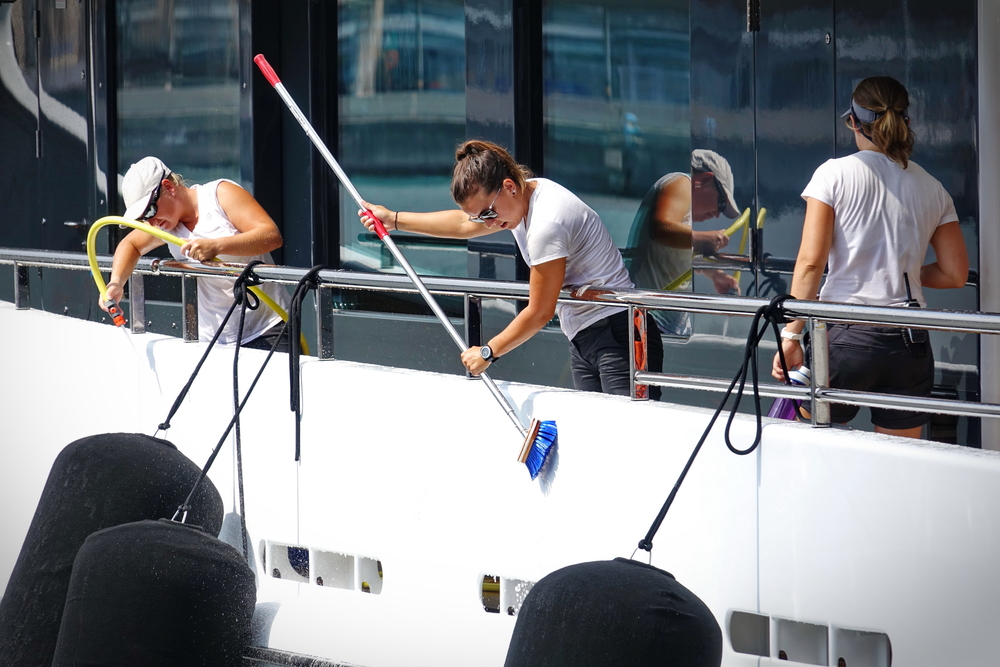
Those weeks (or months) when you have charter guests (or the boss) offer plenty of moments that are less than ideal. To be honest, waking up early to serve breakfast and working a 16-18 hour day is nothing out of the ordinary. While some guests show genuine appreciation, others might call you ‘the girl’ and talk to you like a duchess might to a servant in a BBC costume drama. And you? That’s right, you have your hands behind your back and you smile.
Pro tip: Whether you’re dealing with an owner with more money than manners, a toffee-nosed guest, or an inconsiderate lump whose offensiveness is unintentional, don’t take it personally— it’s their problem, not yours.
You’ll find ironing someone else’s undies to be positively unglamorous
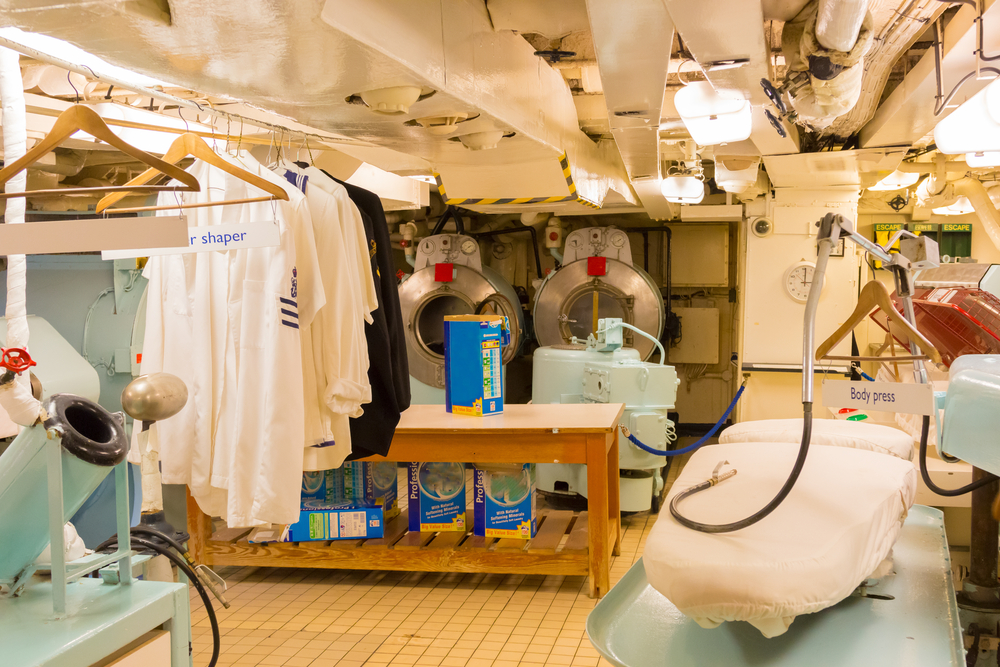
The work mostly consists of detailing and, believe you me, there’s nothing glamorous about that. Mopping up blood juice from the broken meat freezer is something no one aspires doing. Nor is folding little fans from the ends of toilet paper, dusting behind never opened books, or ironing the captain’s Calvin Kleins. In fact, many tasks you’ll be asked to do will make no sense at all . Guess what? You’ll be doing them anyway.
Pro tip: Questioning whether certain tasks are necessary or suggesting a different way of doing things hardly ever goes down well. Almost comparable to being in the merchant navy, you’ll need to respect the chain of command. Simply keep your cool and do as you’re asked and you’ll have very little to worry about.
You won’t make it to your best friend’s wedding

A random rich person (the yacht’s owner, aka, your boss) is now in control of your time, how much you sleep, your general whereabouts, and pretty much everything else that’s going on in your life. Your best friend’s wedding? Christmas with your family? Chances are you won’t be able to make it to either one. Even if there’s nothing scheduled to happen at the time you want to be away, you can be guaranteed that a last minute charter or broker’s viewing will arise and ruin your plans spectacularly.
Say goodbye to privacy and alone time

You’ll be sharing everything and ‘alone’ time will be a thing of the past. What’s more, you’re stuck on a boat with the same people all the time. Most of them are probably people you wouldn’t choose to hang out with and some will have habits that are downright disturbing. When you’re tired, grumpy, and fed-up with having to step over your roomie’s dirty knickers, you’ll start to sweat the small stuff and, occasionally, will feel the urge to strangle somebody. However, you won’t be able to ‘walk it off’ or talk to your mates about it over a beer in the pub.
Pro tip: Although onboard politics are a fact of yachtie-life, don’t join the drama club. Listen and offer advice when appropriate, but avoid getting sucked into someone else’s saga and/or spreading gossip. Oh, and a note on the latter: wherever you are on a yacht, there will always be someone that can overhear your conversation, no matter how far away from the others you think you may be.
There’s no escaping the industry’s ‘golden handcuffs’

Those fat stacks I mentioned as one of the pros? Well, the downside is that it’s easy to become dependent on the income the industry can offer. In fact, many yachties end up feeling trapped within a lifestyle that they themselves have subconsciously created.
Pro tip: Think about the future before you make investments that could ‘imprison’ you. If you don’t, you may one day find that you can’t afford to leave a job that you stopped enjoying a while ago.
Still up for this? Here’s how to go about it:

Step 1: Complete an STCW Basic Training Course. This is required if you dream of being able to work on a commercially registered yacht. Aside from classroom days, this five-day course includes a lot of fun stuff, such as clambering into life rafts and putting out fires the size of a house.
Step 2: Get ready to yachtifie your CV (make sure to mention hospitality work or other relevant experience such as massage or beautician skills) and head to a super yacht hub such as Palma de Mallorca, Antibes, or Ft. Lauderdale.
Step 3: Finally, you’ll need to sign up with one of the yacht crew agencies and keep checking social media pages such as Palma Yacht Crew ; the latter posts jobs and day work positions regularly.
A last word of advice:

Before you start booking flights and selling your furniture, I have one more piece of advice to share. One of the reasons I kept returning to work on boats is that I couldn’t seem to adjust to a ‘normal’ life ashore. Whenever I’d leave a job, I’d get itchy feet and crave adventure and the only way I knew how to get that (with a good salary) was in yachting.
So, if you still find yourself down yachting’s rabbit hole five or ten years from now, don’t say I didn’t warn y’all! But hey, if that rabbit hole includes ticking off a huge chunk of your travel bucket list and making lifelong friends, you’ll have zero regrets.
You might like
Yacht destinations: the 5 best places in europe to sail away.
- Bucket List
27 Heart-Shaped Natural Wonders Around The World
- North America
Castles in America: Discover Your Own Fairytale
10 ways to travel the world for free in 2023.
- Frank Magazine
- Denison History
- Virtual Tours
- Alaskan Yachts
- Azimut Yachts
- Back Cove Yachts
- Beneteau Yachts
- Benetti Superyachts
- Bertram Yachts
- Boston Whaler
- Broward Yachts
- Buddy Davis Sportfish
- Burger Yachts
- Cabo Yachts
- Carver Motoryachts
- Center Console
- Chris-Craft Yachts
- Cruisers Yachts
- DeFever Trawlers
- Dufour Sailboats
- Fairline Yachts
- Feadship Yachts
- Ferretti Yachts
- Formula Yachts
- Fountaine Pajot Cats
- Grady-White
- Grand Banks Trawlers
- Hargrave Yachts
- Hatteras Yachts
- Hinckley Picnic Boats
- Horizon Yachts
- Hydra-Sports
- Intrepid Boats
- Jarrett Bay Sportfish
- Jeanneau Yachts
- Kadey-Krogen Trawlers
- Lazzara Yachts
- Luhrs Sportfish
- Marlow Yachts
- Maritimo Yachts
- Marquis Yachts
- McKinna Motoryachts
- Meridian Yachts
- Midnight Express
- Mochi Craft
- Neptunus Motoryachts
- Nordhavn Trawlers
- Nordic Tugs
- Ocean Alexander Yachts
- Offshore Yachts
- Oyster Sailing Yachts
- Pacific Mariner Yachts
- Palmer Johnson Yachts
- Pershing Yachts
- Prestige Yachts
- Princess Yachts
- Pursuit Yachts
- Riva Yachts
- Riviera Yachts
- Sabre Downeast
- San Lorenzo Yachts
- Sea Ray Boats
- SeaVee Central Consoles
- Selene Trawlers
- Scout Yachts
- Sunseeker Yachts
- Tiara Yachts
- Trinity Superyachts
- Viking Yachts
- Westport Yachts
Yacht Crew Jobs: How To Get Hired + Work On A Superyacht

August 7, 2020 4:50 pm
Interested in working on a yacht denison’s lead crew coordinator jill maderia details what aspiring crew professionals need to know before their first job..
Looking for a job that allows you to travel the world? Working as a crew on a superyacht may be a dream for many. Yacht crew are held to the highest standards of professionalism, catering to superyacht owners and guests to create the ultimate yachting experience. Whether you’re interested in becoming a deckhand, stewardess, or chef, we’ll break down how to enter the yachting industry and provide tips on how to prepare for your first yacht crew job.
Q: What courses do I need to complete before working on a yacht?

A: Crew must have the basic safety course called STCW. If they are working on a charter yacht, they will also need the ENG1 (medical clearance). While STCW is the basic course needed, addition courses might set you apart, as it shows commitment to a career on yachts.
For example: The Power Boat class is important to have if you are deckhand, but having this and learning how to drive a tender, would benefit anyone that works on a yacht.
Any extra courses such as hospitably, silver service, mixology are a plus and will help crew better market themselves for opportunities.
Q: After completing my courses, how do I get a job on a yacht?

A: You must have a great CV. Create a portfolio of your work. If you are a Chef or stew, have photos of your food, table settings, flower arrangements. I have had a deckhand show “before and after” projects such as teak work on deck too. Our crew website can create an album of your work.
Plus, showcase your skills. While qualifications are required, your skills that you have might be the reason you get that dream job. Many boats, especially charter yachts, seek out crew with additional skills, whether it be a stew with cooking or childcare experience, or a deckhand that is also a drone operator or photographer.
Q: Do I want to work on a private yacht or a charter yacht?

A: There are benefits to both. There is a difference, as charter boats you will have a combination of owner vs. charter guests. In addition, crew often like the benefit of the additional gratuity at the end of a charter, which can be a range of 15-20%.
Q: What is the interview process like for yacht crew?

Presentation is key: Both with your CV, and in your interview. Your first impression is important, so dress the part as much as you can. Keep in mind, many interviews are via FaceTime or Zoom. Treat virtual interviews the same as you would in-person, show up on time and be professional.
Q: How can networking help my crew career?

Go to crew events, or consider crew housing. You never know where your next job may come from. Maintain relationships with crew agents, other crew members, and industry professionals. It important to be out and meeting people in person or even virtually on Zoom.
Q: Any other tips that will help in landing a yacht crew career?

- 1) Research: Read industry publications. This is especially important for those who have never worked in the hospitality industry. In addition to taking your courses, conduct your own research.
- 2) Crew Housing: When crew stay at a crew house, they have the benefit of networking with other crew. They may even find jobs from crew mates and share ideas and tips in the industry. There are a variety of crew typically, from green to experienced and they all have a story to tell or some wisdom to share.
- 3) Daywork: Sometimes daywork can lead to long term opportunities. While daywork is temporary, crew may not realize that daywork can lead to the Captain or department head interviewing you and seeing how you might fit in with a boat full time.
- 4) Checking in: Check in with your agents. The better your crew agent knows you, the easier it is for them to properly match you to a boat. Keep your crew agent informed on if you’re still looking for work.
Ready to start your career in crew? Contact Lead Crew Coordinator Jill Maderia , or explore all the options Denison Yachting offers in our crew division.
Jill Maderia
- Email: [email protected]
- Cell: 954.600.7058
- Office: +1.954.278.9250
- Show Listings
Latest News

NEWS | March 29, 2024
Conrad shipyard launches c144s hull #2 [extra time], christening ceremony in poland to come.
Conrad Shipyard Launches C144S Hull #2 [EXTRA TIME], Christening Ceremony in Poland to Come Conrad has officially launched its second C144S, named EXTRA TIME. Denison Yachting would like to congratulate Conrad Shipyard on the recent launch of EXTRA TIME, which is Hull #2 in the award-winning C144S series. Yacht broker Alex G. Clarke, who

2024 Newport Beach International Boat Show
2024 Newport Beach International Boat Show Denison invites you to view a number of available brokerage boats and yachts at the 2024 Newport Beach International Boat Show. Incorporating live entertainment, immersive activations and beautiful yachts from top builders and brokerages, the event offers attendees a one-of-a-kind

NEWS | March 27, 2024
Space tourism: rocket man.
Space Tourism: Rocket Man How space tourism became the next big trend in luxury travel and gave rise to the “billionaire space race”. This article was written by Rachel Ingram. As the world becomes increasingly well-traveled, people are looking further and further afield for
Working On Yachts
There are currently over 15,000 yachts in the world large enough to require professional, qualified yacht crew and as a result this industry is growing rapidly each year.
A career in yachting can be rewarding, exciting and a wonderful opportunity to travel the world and explore new horizons!
Wherever there is water, you have the potential to go. Traditionally the yachting industry in the Mediterranean runs from April until September and from November to April in the States & Caribbean. Having said that, the possibilities are endless with many yachts circumnavigating the world.
Yachting is an eye opening, ultimately fun industry that demands hard work, perfection and attention to detail. We work with yacht crew every day and have a deep insight into what new crew should do to make the most of their career. Here are our top ten tips for starting out.
You cannot work on board a luxury yacht without getting your basic qualifications first. Bluewater offers a full range of crew training courses for those just starting in the industry:
- STCW 95 Basic Training (Europe) 5 Day Course
- Powerboat Level II 2 Day Course
- Interior Introduction 3 Day Course
- AEC 1 5 Day Course
We have a sample copy and lots of relevant advice on creating your first yachting CV within our 'Your CV' section.
Certain times of year are more favourable for new crew looking to join the industry. If you are going to Antibes or Palma, we advise end of March/April. Fort Lauderdale is different in that it is sunny most of the year, however there is a peak recruitment season around November each year.
In every yachting hub you will find english speaking bars and cafes filled with yacht crew. Make sure you go and explore to build your network within yachting. Although global, it is a small industry so make sure to present yourself professionally.
Finding your first position in yachting is the hardest. Make sure you are dock walking, looking for day work opportunities and handing out your CV. You may find that one day's work leads to a permanent role or other job interviews.
Read websites, follow yachting news, learn from other crew who were in your 'deck shoes' a few years ago. Good examples of yachting websites & magazines are:
- Bluewater bluewateryachting.com
- Dockwalk dockwalk.com
- The Crew Report thecrewreport.com
- The Triton thetriton.com
Apply for jobs, manage your course bookings and sign up for events.
You can buy pay as you go SIM cards either in newsagents or specialised telephone shops around the Mediterranean. This will help to save you money when job hunting!
Captains check Facebook and Twitter pages before interviews. Make sure any public images of you are professional and will not reduce your chances of employment. Once employed be sure to avoid any posts about your yachts, current location and inappropriate images.
A smart, professional appearance will win over shorts and a beach top.
The most important aspect when you are looking for work is to make sure your CV is up to date, well written and includes any relevant experience that you might have.
It is best to emphasize any hospitality experience or customer service skills you may have had, such as waitressing, hostessing, silver service, bartending, cooking, nanny/au-pairing, babysitting, flower arranging, cleaning and/or laundry experience.
Should you wish to join the engineering department, make sure you include all mechanical experience and qualifications, including all work done in refrigeration, air conditioning, work with engines, and any electrical work, electronics or AV/IT.
The most important aspect to include is any recreational sailing experience you may have had. If you are also qualified or experienced in woodwork or carpentry, have painting, polishing, varnishing know-how, then that is also great. In addition any diving, sailing, fishing, any water sports background are all fantastic skills that are easily transferable.
We deal with a great multitude of chef positions, ranging from crew chef to head chef. Most positions will require some form of culinary training, however some crew succeed in entering this department through the stew/cook route on a smaller yacht.
When filling in your online profile with us, make sure to only select positions that you are qualified to do onboard. Selecting more than 3-4 positions on your profile can confuse potential employers and effect our search results.
Your CV should be no more than two sides of A4, including your photograph (in colour, face on, without sunglasses).
Your CV should be in a word format to ensure it can be opened easily by all employers.
List all recent contact information, references and work history.
Including a personal statement, along with a clear objective can help distinguish you from other candidates and helps prospective employers grasp your long term goals.
Don't give employers an excuse to dismiss your CV, review and spell check it!
Salary Guidelines

Knowledge is power and the more you research, the more informed & on the ball you will be.
Make sure you have a printed copy of your CV with you and always arrive early and dressed in a smart way. Research the yacht, make yourself prepared & don't be afraid to ask questions.
The key to getting your first job is to network! Always carry a copy of your CV with you.
Remember the industry is a tight, professional network therefore it is crucial to communicate with others, walk the docks, distribute your CV and register with crew agencies. Bluewater is one of the longest-established crew agents - we have been finding people yacht jobs since 1991!
Keep the agencies up to date! Always make sure your profile has the correct location and contact numbers for you so we can get hold of you when we have the perfect role for you.
Your profile is essential to us finding you work, both now and in the future. We rely on the information you input to match you to the right jobs, so please make sure it is up to date and at least 85% complete. We receive thousands of vacancies each year, and search our database for the best candidates for each one... You will hear from us more often if you are checking in regularly! Once you find work you can set your profile to 'Not Available'.

- Charter & Brokerage
- Yacht Design & New Builds
- Tenders & Toys
- Superyacht Events Calendar
- Career & Training
- Departments
- Superyacht Crew Finances
- Sustainability
- Shipyards and Marinas
- Health & Wellbeing
- Polar Region
- Our Services
- Meet the Team
How To Start A Career In Yachting
.png)
Been wondering how to start a career in the the superyacht industry, or aren’t sure why your CV isn’t getting you anywhere? Wilsonhalligan Recruitment is here to explain.
In recent times, agencies have noticed more CVs from junior crew with limited experience. Unfortunately, these candidates often don’t meet the high standards expected in the yachting industry which makes it tough for them to find the right job. They might end up on a yacht that isn’t the best fit, which is less than ideal for everyone involved. Read on for what you need to work on a superyacht and what steps you can take.
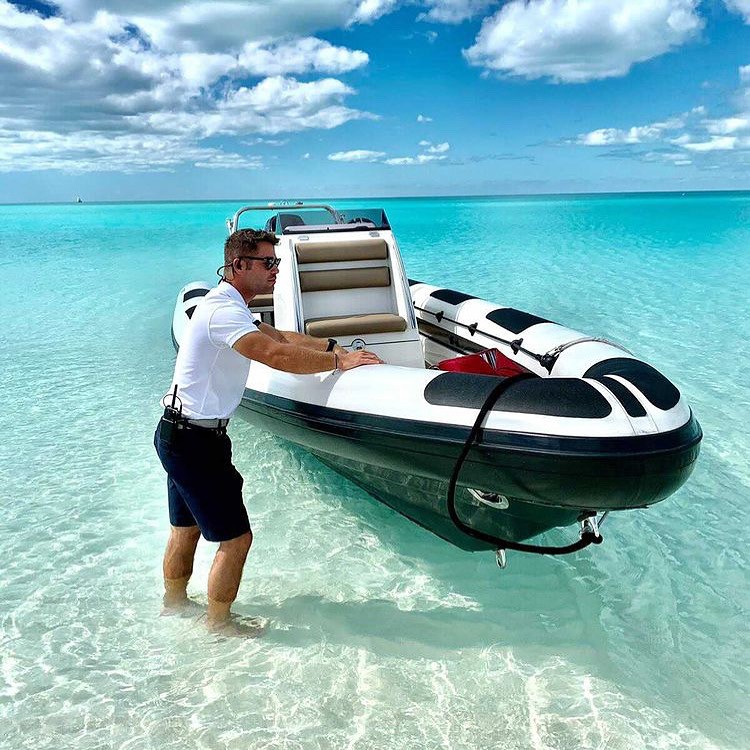
What Do You Need To Work On Superyachts?
Life experience.
Preferably, a candidate is someone who has had experience living independently.
It’s important to handle your own responsibilities like:
Working on a yacht means you’ll be living away from home, away from your friends and family. Sometimes this may feel incredibly isolating – it isn’t for everyone! If you haven’t lived independently before, adapting to this lifestyle can be a shock.
Work experience
Ideally, a candidate will have held a full-time job for a minimum of six months – preferably in a role relevant to yachting.
In the yachting industry, some boats may require you to work seven days a week during a season, with 50% of your time spent working at night. You’ll be sleeping in a noisy environment, with a loud engine and anchor drops, and will be in close proximity to your colleagues most of the time.
With limited downtime, it’s an exceptionally demanding job. The more exposure you’ve had to challenging working conditions in the past, the better equipped you’ll be to not only survive but thrive in this environment.
The yachting industry has a clear chain of command and hierarchy that demands respect. You’ll be taking instructions from people across various departments, and your colleagues may come from diverse cultures, nationalities, and age groups.
The more exposure you’ve had to challenging working conditions in the past, the better equipped you’ll be to not only survive but thrive in this environment.
What Are Recruiters Looking For?
The list is pretty endless. Relevant skills and experiences are very appealing, and all of the below suggestions should have been undertaken in a professional, paid working environment:
- High end hospitality. For example, Michelin starred restaurants, 5 star hotels, Luxury estates, members clubs (in service or housekeeping). Pub or café work is a great start – but to truly impress, higher end hospitality work is better
- Event management (the more high-end the better)
- Floristry, barista, mixologist, beautician, masseuse, yoga / Pilates instructor, PT
- Boat building, carpentry, building work, good with hand & power tools
- Water sports instructor. For example, diving, wake boarding, kite surfing
- Boat maintenance, working in a marina, driving small boats
- Paramedic / nurse, additional medical training skills (from the military for instance)
While there are other desirable skill sets, the ones mentioned are the primary ones. To emphasise, it’s important to have a minimum of six months of experience in these roles, depending on the position. While short courses in areas like cocktail making or floristry can enhance your CV, they lack the same appeal without accompanying in-depth work experience.
What Are The Next Steps?
Don’t have the above skills? Take a different approach.
Instead of pursuing a yacht job immediately, redirect your efforts towards securing a land-based position that allows you to develop skills in these areas. Use this time to enhance your qualifications. This can only make you a stronger candidate and improve your prospects of landing a long-term yachting role.
When considering the yachting industry, it’s essential to approach a career with a realistic mindset.
Debunking Crew Myths!
It isn’t all smooth sailing! Aspiring crew members might have certain expectations based on popular portrayals of superyacht life. However, it’s crucial to debunk some common myths:
- You Can Chill Out When The Guests Go: Contrary to reality TV, post-guest trips involve extensive cleaning and preparation for the next voyage. As crew members, you often don’t have access to guest facilities.
- You Have Plenty of Chances To Explore: While some yachts visit incredible destinations, the ability to explore depends on the yacht’s itinerary. Work commitments may limit your chances of going ashore, especially if you are part of the engine room or interior team.
- It’s A Glamorous Job: Yachting is undoubtedly an exciting industry with opportunities to interact with celebrities and affluent clients. However, the job often involves challenging tasks – you’ll be more of a glamorised cleaner or waiter.
- You’ll Always Get Big Tips: While there’s potential for good tips, it’s not guaranteed, especially on private yachts where tipping norms may differ.
- Short Courses Guarantee Ease of Entry: Completing a short deckhand or stewardess course doesn’t guarantee an easy job search. Yachting is highly competitive, and experience, even outside the industry, is often valued more than specific courses.
- Everyone Gets Along: On-board life may seem like a happy family, but limited space and close quarters can lead to occasional friction. Adherence to rules and hierarchy is crucial, with the captain as the ultimate authority.
- Fast Progression Is Easy: Experience is key for career progression. While exams can be completed, gaining practical experience takes time. Building strong foundations is essential for long-term success.
- Yachting Is a Great Gap Year Opportunity: While not impossible, pursuing yachting as a gap year may be challenging unless you have a strong and relevant background. Many yachts prefer crew members committed to a long-term career.
When considering the yachting industry, it’s essential to approach a career with a realistic mindset. Despite the fantastic rewards, the industry demands hard work, and many newcomers discover it may not be the right fit for them. Be cautious. The media has a habit of depicting everything through rose-tinted glasses. Remember to be skeptical if someone asks you to pay anything before they find you a job.
Visit Wilsonhalligan Recruitment’s website here: https://www.wilsonhalligan.com/

To keep up to date with the latest Superyacht Content News, click here .
Sign up to our Newsletter below:
Newsletter Signup
- Your Name First Last
- Your Email *

Maisie Granger
Related articles, life after yachting: oceanform. from wearing uniform to designing them, the crew network – top jobs this week, the crew network: introducing their palma office, how easy is it finding yacht crew jobs as a couple.

Popular Posts
- Guest Cocktails: 2023’s Delectable Mixology
- 36m Phi Chase Boat ‘Phantom’ Launched By Alia Yachts
- Miami International Boat Show: Yachting Ventures & Seaworthy Collective Launch Blue Startup Pitch Event
- Superyacht Language: Nautical Terms Every Crew Member Should Know
- How We Can Improve The Oceans One Department At A Time
Superyacht Content
Social media influencer and digital brand expert.
Superyacht Content brings you the latest in social news for the superyacht industry.
Keep up to date with us across our social channels, and don’t forget to hit that share button!
- Superyacht News
- Superyacht Jobs
- Superyacht Marketing
Join our Newsletter
Copyright © 2023 Superyacht Content | Website Design by Zonkey
Privacy | Credits | Get in Touch
Impartial training and careers advice
Call us: +441983 280 641
+441983 280 641
- How to become a Yachtie
So you’re thinking about becoming a Yachtie?
You may have a friend or relative who already works in the industry, or you have watched TV programmes like Below Deck , you know working on a yacht is the right for you, but where do you start?
With the potential to earn great money, travel, and work with loads of like-minded people, it’s not surprising this job ticks a lot of boxes for many people.
Becoming a Yachtie and getting paid to work on luxury yachts may seem like a job and industry that only the elite can have access to, or it just seems too confusing to start.
However, with an understanding of the requirements, certification, and having some expectations of what job role you should be looking for, starting work as a Yachtie will not seem so daunting.
What is a Yachtie?
Before we go any further, let’s make sure we are all singing off the same hymn sheet.
A Yachtie is a broad term used to describe anyone who works on a yacht. More specifically, it has become the term for people working as yacht crew on superyachts.
A superyacht is a very large boat that is extremely luxurious and often owned by multi millionaires and billionaires.
These Yachties who work on superyachts hold a number of different positions. Most Yachties will start their superyacht career working as a Deckhand or Stewardess. With more experience and responsibilities, your role will change as you progress up the career ladder.
It’s worth noting there are other types of yachting and Yachties. The other kind of ‘Yachtie’ could describe those who hold their Yachtmaster qualification and have jobs like skipper charter boats.
Job roles for new Yachties
Yachties new to the industry (also known as ‘Green’ Yachties) will traditionally apply for entry levels roles, which are Yacht Deckhands or Yacht Stewardesses.
These are both very different jobs, so you need to be sure which one you want to do and start training for that career path.
Yacht Stewardess (Stew)
A Stewardess, or Steward , looks after the interior of the yacht. This means anything that happens inside the boat, you will be responsible for it.
Think of any job in the hospitality industry and then combine it into one role on a yacht, that is what you will be doing.
From making beds, doing the laundry, cleaning, serving food, and hosting dinner, you will do it all to a 5-star standard. Anything less than perfect, and your guests won’t be satisfied.
It’s the small things that make the difference between high standards and exceptional standards. You must have a great eye for detail and be able to make sure no stone is left unturned. Everything on board the ship must be 100% perfect at all times.
You will be reporting to Chief Stew, who will be your manager and give you your task list. After a good few seasons as a green Stewardess, you will have enough experience and confidence to apply for Chief Stewardess roles.
Yacht Deckhand
In contrast to the Stewardess role, Deckhands look after the exterior of the boat.
Predominantly a male role, Deckhands will do everything from general maintenance to cleaning the teak deck, looking after the toys (Jet Skis, etc.), and even driving the tenders.
Deckhands should know how a yacht operates, the basic terminology used onboard, how to tie knots, and loads and loads of enthusiasm.
Deckhands may also dip in and out of helping the Stewardesses, and it isn’t uncommon for Deckhands to give a hand during busy evening meal preparation and service.
5 steps to Becoming a Yachtie
With an understanding of the job roles available, you can now decide which one best suits you. With the right attitude, qualifications, and knowing where to look for work, becoming a Yachtie is achievable for anyone who wants it.
- Have the right attitude
- Pass an ENG1 medical
- Complete STCW Basic Safety Training
- Gain experience
- Go to a superyacht marina
1. Have the right attitude
Along with gaining the correct qualifications to prove your competence, to become a Yachtie, you must have certain characteristics to thrive in this industry.
Yachties have to be well presented, articulate, know how to take orders, and be able to work hard, all with a smile and enthusiasm. You have to be able to work incredibly long hours, sometimes under stressful conditions, without losing your patience.
Having a job on a superyacht may sound glamorous, but if it’s your 10th day working in a row and you’ve got your head stuck down a toilet trying to clean it, you may want to think again. To become a Yachtie, you have to be happy with spending a lot of time away from home without seeing your friends and family. This may all seem obvious, but this situation does not suit everyone, and without careful consideration of the negatives, you will leave this industry quicker than when you arrived.
2. Pass ENG1 Medical
The first actionable step you need to take to become a Yachtie is gaining an ENG1 medical certificate. The ENG1 medical is an examination by an approved MCA (Maritime and Coastguard Agency) Doctor to make sure you are fit and able to work at sea.
Every single person working at sea must have an ENG1 medical certificate , without this, you are not able to start working on superyachts. The examination will take around 45 minutes, during which the doctor will go through a checklist to make sure you have no underlying health conditions that may impact the safety of you or anyone else on board the ship.
The most common reason new yachties fail the ENG1 is colour blindness. Surprisingly many people can go through their whole life without knowing they are colour blind. However, on board a ship, this can have huge implications. If you cannot identify signals and lights correctly, it will be impossible for you to help navigate the ship in an emergency. Unfortunately, this means you cannot start work as a Yachtie.
3. Complete STCW Basic Safety Training
Another requirement for working at sea is completing STCW Basic Safety Training . Similar to the ENG1 you can only get a job on a yacht if you have the STCW certificate.
STCW stands for ‘Standards of Training, Certification and Watchkeeping’. It is to make sure that all Seafarers have an understanding of what to do in an emergency and are aware of the procedures required.
STCW Courses are action-packed and quite a bit of fun. From fire fighting to sea survival, you will get stuck in learning, and learn loads of new skills.
4. Gain experience
If you are lucky enough to have a job offer on a superyacht, then having your ENG1 and STCW certificates will be enough.
Don’t worry if you haven’t already got a job offer, it’s quite normal to go through all these steps and not have a job lined up yet. If this is the case, gaining more experience and qualifications is a good idea to give you a competitive advantage over anyone else applying for the same job role.
This is achieved through signing up to a Deckhand or Stewardess Course. On these courses, you will get your standard STCW certificate and a list of extra qualifications demonstrating your competence, ability, and commitment to the industry.
Deckhands will learn how to drive a small yacht, engine maintenance, general yacht repair, and how to clean teak properly. Stewardesses will understand wine and how to serve it, the art of flower arranging, and how to drive a powerboat.
5. Go to a superyacht marina
After you have completed your superyacht training, now is the time to head out to France and look for work. Along with signing up to yacht crew recruitment agencies, going to one of the main superyacht marinas and handing out your CV to Captains is a great way to find work. This is known as dockwalking.
If you complete your Superyacht Course with us, you will have the option of signing up to our recruitment day in Antibes, France. We head out to France as a group, talk you through the process and offer you our industry contacts.
This is a great way to start your journey, and all our students find work in no time.
How much do Yachties make?
So you’ve heard you can make a good amount of money working on superyachts? Along with the travel, the great salary is why many people decide to become a Yachtie.
Like a job within any industry, salary varies. A Superyacht will agree on a crew salary budget with the owner of the yacht.
If you are just starting out, you can expect a salary of around €2,200 – €3,200 per month. However, the industry standard is €2,500 per month. Once you gain more experience and qualifications, your salary will increase.
When you look at the salary at face value, it looks great but not incredible, however when you are at sea, you have zero outgoings. Working on a yacht means you don’t have to pay rent, bills, or buy food which will save you heaps of money compared with working at home.
If you want to see the salaries of all yacht crew, check out our Salary Guide.
Do Yachties pay taxes?
Another reason why the salary is so appealing is that in most cases Yachties don’t have to pay tax.
This is a government scheme called the Seafarers Earning Deduction , and providing you are eligible, Yachties can keep 100% of their earnings.
To be able to apply for Seafarers Earning Deduction, you must be working on a ship outside of UK waters for a period of 365 days. This doesn’t mean you have to spend a whole year at once away from home, rather you can only apply once all the days you work on a yacht adds up to 365.
Being able to understand this tax scheme will be hugely beneficial before you start working on a Superyacht.
Download our free Guide
Want to know more about working on a Superyacht, please download our free guide .
Related articles
- Seafarers Tax
5 ways to ensure your SED claim is rock solid
The Seafarers’ Earnings Deduction, often referred to as the SED, is a tax legislation that enables seafarers to claim back their UK income tax. It a...
Do I need to pay off my Student loan if I work on a Superyacht?
Good question! First, let me say that the information below is aimed at people who have studied in the UK and took out a Student Loan to cover course ...
Have I got the right experience to work in yachting?
If you’re thinking about working on board a Superyacht, we share the skills and experience you need and how to get into the yachting industry in thi...

Yacht Engineer Training Courses
MCA Superyacht / SV Engineer training for vessels up to 9000kW and 3000GT
Yacht / SV Engineer Training Overview
Although there are different training routes and licensing authorities/countries under which engineers may qualify to work on superyachts, a common, broadly accepted route is the MCA Engineer Small Vessel Training Route. The MCA recently changed its engineering qualification structure in order to simplify the number and level of qualifications across the industry. They have pulled together pre-existing qualifications, leading to certificates of competency (CoC) restricted to yachts (and other small vessels) only. This single generic qualification is now referred to as " Engineer Officer Small Vessel Certificate of Competency" .
Please consult a recognized training provider before booking any training courses and view the "Engineer Officer Small Vessel of Competency" Marine Information note, found on the MCA website.
Find info, requirements and links to yacht engineer training centres for:
- Junior / Assistant Engineer
- 2nd Engineer Officer < 9000kW
- Chief Engineer Officer < 9000kW
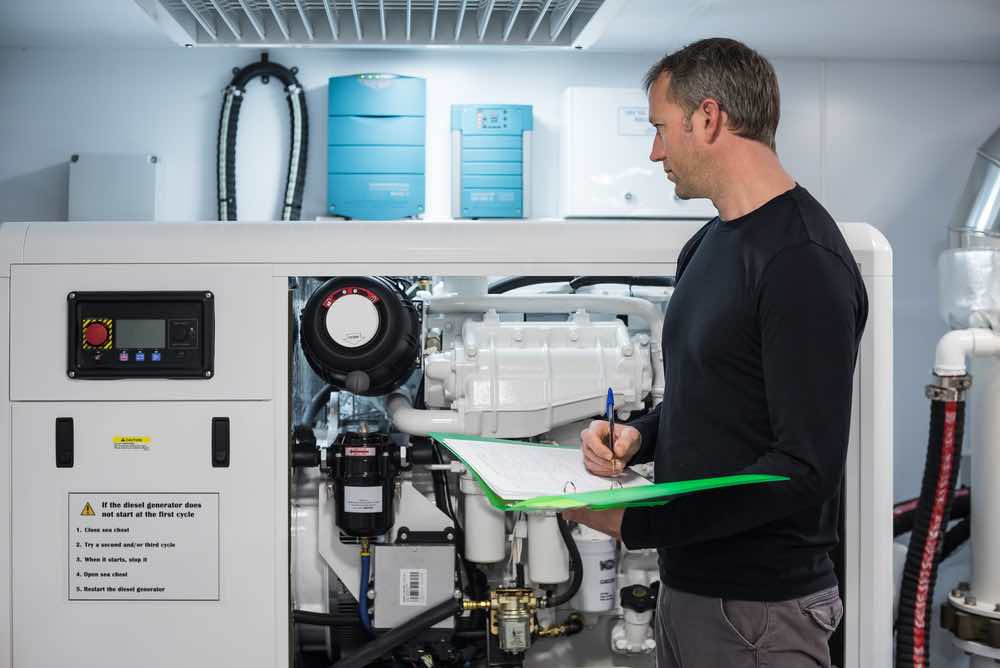
Junior / Assistant Engineer:
- An STCW : EVERY crew member onboard must hold a valid STCW
- An ENG1 Medical Certificate : EVERY crew member onboard must hold a valid ENG1
- AEC 1: The Approved Engine Course 1 is an entry-level qualification for the MCA engineering training schedule and is regarded as the first step on the ladder. It is generally a 5-day / 30-hour course that aims to provide candidates with practical basic hands-on training and theoretical knowledge of diesel engines. The main intention of this course is to teach the knowledge to serve in an ENTRY LEVEL capacity in the engineering department or for a crew member primarily working in another department to assist with engineering functions, for example, a deck/engineer. Holding an AEC certificate will allow you to be a chief engineer on a yacht over 24m and less than 200 Gross Tons or act as an assistant engineer on vessels over 200 GT up to 60NM from a safe haven.
- AEC 2: The Approved Engine Course II follows on from AEC I knowledge. It contains a more practical element when compared to the AEC I. This course has been designed so that engineering qualifications are transferable between different industry sectors such as yachts, workboats, tugs, fishing vessels and so on and there will no longer be offshore limits.
The AEC is your gateway ticket into becoming an engineer, it is, therefore, essential to hold this qualification, gain sea time and work on your training record book (TRB) in order to progress in the engine room.
Becoming a 2 nd Engineer:
There are three routes to obtaining a 2 nd Engineer Officer Small Vessel Certificate of Competency’ (Previously known as Y4):
- Standard Route
- Experienced Seafarer Route
- Alternative Route (For Graduate Engineers)
Standard Route:
This standard route benefits those who study through an accepted route of education involving MSQ (Maritime Studies Qualifications) modules. Completion of these will result in a Diploma in Maritime Studies: Small Vessel Engineer’. This route is extremely beneficial to superyacht engineers because of the reduced sea time required and because some of the syllabi can be completed on-board.
In order to follow this route, you must:
- Hold a Diploma in Maritime Studies: Small Vessel Engineer
- Complete Approved Engine Course I (AEC I) as well as The Approved Engine Course II (AEC II)
- Have completed 12 months’ combined sea service and workshop training, which must include: - 6 months’ seagoing service engaged in watchkeeping or Unmanned Machinery Space (UMS) duties on vessels of at least 350 kW; - 5 months’ seagoing service on vessels of at least 350 kW; - 2 weeks MCA-approved Initial Workshop Skills Training; - A further 2 weeks seagoing service on vessels of at least 350 kW or 2 weeks of MCA-approved additional Workshop Skills Training.
- Complete the MNTB Small Vessel Training Record Book (TRB)
- Complete the Diploma in Maritime Studies: Small Vessel Engineer
- Pass the MCA-approved written exams for - Marine Diesel Engineering ; - Auxiliary Equipment Part – 1 ; - Operational procedures, Basic Hotel Services and Ship construction
- Hold the applicable ancillary and safety courses: - All STCW Basic Training Modules - PSCRB - Advanced Fire Fighting - Proficiency in Medical First Aid - Human Element, Leadership and Management (Operational Level)
- Hold a valid ENG1 Medical Certificate or MCA accepted Equivalent
- Complete MCA oral examination for Second Engineer Officers on Small Vessels less than 9000 kW, less than 3000 GT, unlimited area, III/2 (syllabus available online, go to www.gov.uk and search “Small Vessel Oral Examination Syllabus”).
Experienced Seafarer Route:
This route is for existing seafarers serving on small vessels. You will not be required to complete the Diploma in Maritime Studies: Small Vessel Engineer , however you will need to complete a preparatory college course and SQA written examinations.
To be eligible to register for a study programme you must meet the following requirements:
- Have completed 24 months’ seagoing service on vessels of at least 200 kW
- Hold an Approved Engine Course (Both AEC 1 & AEC 2 )
- Hold STCW Basic Safety Training certificates: - Personal Survival Techniques (STCW Code A-VI/1-1) - Fire Prevention and Fire Fighting (STCW Code A-VI/1-2) - Elementary First Aid (STCW Code A-VI/1-3) - Personal Safety and Social Responsibilities (STCW Code A-VI/1-4)
Requirements / Notice Eligibility to sit MCA Oral Exam:
In addition to the above, candidates must complete the following in order to be issued with a notice of eligibility (noe) to sit an mca oral examination:.
- Additional 11 months’ seagoing on a vessel of 350 kW (must include a minimum of 6 months' seagoing service engaged in watchkeeping or UMS duties)
- 2 weeks MCA-approved initial Workshop Skills Training
- A further 2 weeks seagoing service on vessels of at least 350 kW or 2 weeks of MCA-approved additional Workshop Skills Training.
Certificate of Competency (Coc):
In addition to completing all of the experienced seafarer route requirements above, the candidate must:
- Complete and pass the following courses:
- MCA Marine Diesel Engineering
- MCA Auxiliary Equipment Part - 1
- Operational procedures, Basic Hotel Services and Ship Construction
2. Hold the applicable ancillary and safety course certificates listed in section 5:
- All STCW Basic Training Certificates - PSCRB - Advanced Fire Fighting - Proficiency in Medical First Aid - Human Element, Leadership and Management (HELM Operational Level)
3. Hold a valid ENG1 Medical or ENG1 Medical Equivalent Certificate 4. Pass the MCA oral examination for Second Engineer Officers on Small Vessels less than 9000 kW, less than 3000 GT, unlimited area, III/2 (syllabus available online, go to www.gov.uk and search “Small Vessel Oral Examination Syllabus”)
Alternative Route: (For Graduate Engineers:)
This route is for those candidates who hold a relevant engineering degree/diploma/apprenticeship. These qualifications should be sent to an MCA-approved training provider who will analyze their relevance and explain what the individual should do in order to obtain a 2 nd Engineer Officer Small Vessel CoC.
More information on the types of Graduate and Apprenticeship holders that qualify for this training route can be found in section 3.5 of the MIN 524 Notice .
If you are deemed eligible to enter into this programme you will need to apply directly to an MCA-approved nautical college. In order to find an appropriate college, search www.gov.uk for “MCA-approved nautical colleges".
In order to gain the Certificate of Competency you must:
- Complete a minimum of 6 months’ seagoing service engaged in watchkeeping duties
- Additional seagoing service / Workshop Skill training requirements based on the relevant HND, HNC or Engineering Apprenticeship, as laid out in point 3.5.3 of the MIN 534 Notice.
- Hold an Approved Engine Course I (AEC I)
- Hold an Approved Engine Course II (AEC II)
- Successfully Complete the MCA-approved modules and pass the corresponding exams for:- Marine Diesel Engineering - Auxiliary Equipment Part - 1 - Operational Procedures, Basic Hotel Services & Ship Construction
- Hold the applicable ancillary and safety course certificates:- All STCW Basic Training Certificates - PSCRB - Advanced Fire Fighting - Proficiency in Medical First Aid - Human Element, Leadership and Management (HELM Operational Level)
- Hold a valid ENG1 Medical or ENG1 Medical Equivalent Certificate
- Pass the MCA oral examination for Second Engineer Officers on Small Vessels.
Becoming a Chief Engineer :
- Chief Engineer 3000kw & <500GT
- Chief Engineer 9000kw & <3000GT
Chief Engineer Officer < 3000kW & 500GT
In order to qualify for the issue of this Certificate of Competency you must meet the following requirements:
- Complete a minimum of 6 months’ seagoing service as a Second Engineer on vessels of at least 350 kW (While holding an SV Second Engineer Officer < 9000kW & 3000GT STCW Convention regulation III/2 Certificate of Competency.
- Successfully complete the MCA- approved modules and pass the corresponding written examinations for - Chief Engineer Statutory and Operational Requirements - Auxiliary Equipment part - 2
- Hold the applicable ancillary and safety course certificates: - All STCW Basic Training Certificates - PSCRB - Advanced Fire Fighting - Proficiency in Medical First Aid - Human Element, Leadership and Management (HELM Management Level)
- Pass MCA oral examination for Chief Engineer Officer, less than 3000 kW, less than 500 GT, unlimited area, STCW Reg III/3
Chief Engineer SV <3000 GT & <9,000kW
- 24 months of seagoing service which must include:12 months as an SV Second Engineer or SV Chief Engineer while holding the applicable STCW Convention regulation III/2 Certificate of Competency:
- 6 months of sea service on 350 kW vessels & 6 months seagoing service on vessels 750 kW. (greater or equal to kW provided)
- Chief Engineer (SV) Statutory and Operational Requirements (Not required if SV Chief Engineer less than 3000 kW, less than 500 GT CoC already held)
- Chief Engineer (SV) Auxiliary Equipment Part 2 (Not required if SV Chief Engineer less than 3000 kW, less than 500 GT CoC already held)
- Applied Marine Engineering
- Complete either:a) MCA-approved modules and pass the corresponding written examinations for: General Engineering Science I & General Engineering Science II (exemptions may apply for candidates holding appropriate engineering degree) OR The Diploma in Maritime Studies: Small Vessel and the Diploma in Maritime Studies: Small Vessel Chief Engineer
- All STCW Basic Training Certificates
- Advanced Fire Fighting
- Proficiency in Medical First Aid
- Human Element, Leadership and Management (HELM Management Level)
- Pass the MCA oral examination for Chief Engineer Officer, less than 9,000 kW, less than 3,000 GT, unlimited area, STCW Reg III/3
FOR MORE INFO GO TO MCA WEBSITE MIN524
Alternative Routes to Become a Yacht Engineer:
The above method is the new MCA-approved and advised route to become a YACHT engineer, there are however other options available to you:
Experienced Marine Engineers: Marine engineers with qualifications for larger vessels, such as commercial tankers, container vessels, dredgers etc. or those with merchant navy tickets are usually able to work on yachts with these tickets. It is important to contact the MCA who will review these qualifications and ascertain a plan of action for you.
USCG: It is also possible to qualify as a yacht engineer through the United States Coast Guard route, again different flag states will have different requirements and it is advisable to contact the MCA for any further advice or information.
Find a Training Course Provider
Select a Course in order to view all training providers (use the location filter on the results page in order to refine your search).
STCW Basic Training Advanced Fire Fighting Approved Engine Course (AEC) HELM General Engineering Science 1 General Engineering Science 2 Proficiency in Medical First Aid SV Marine Diesel Engineering Proficiency in Survival Craft & Rescue Boats (PSCRB) SV Auxiliary Equipment SV Operational Procedures SV Applied Marine Engineering
Username or Email Address *
Remember me Lost your password?
Username or Email
Get New Password

The Quick & Easy Guide to Superyacht Chef Careers

This article is the latest instalment in our series of guides on superyacht careers. We’ve already covered deck , interior and engineering careers, but today it’s time to get delicious and discuss the career pathways for chefs on board yachts.
As always, the information in this guide is brought to you by the experts at the careers guidance platform, Academy by Ephemeris . Start or advance your yachting career with Academy by Ephemeris, the only online tool that connects superyacht crews and aspiring crew with yachting industry training providers worldwide.
What does a superyacht chef do?
A superyacht chef is in some ways, the central character in a guest or owner’s experience on board. They are the unsung heroes that use the culinary arts to turn yacht voyages into unforgettable memories, and it’s all done from the galley - the marine industry term for the onboard kitchen.
The chef’s primary responsibility is planning, preparing and cooking food for the guests/owner, the captain and the crew. But there’s a lot more to the chef’s job, too.
The chef’s daily responsibilities include regularly provisioning all required food items, which also entails frequent food inventory records to ensure that any food items required for a particular trip or charter booking, are ordered and delivered on time. They are also responsible for checking that all received food items meet the yacht’s standards, following which all items must be safely and correctly stored according to all required food safety and storage standards.
Galley safety and sanitary standards are also the chef’s responsibility, and if other galley staff are on board - as they may be on larger yachts - the chef is responsible for managing those staff, too.

How do I become a superyacht chef, what qualifications do I need?
Generally, you would begin by obtaining formal food preparation training, such as an NVQ (National Vocational Qualification) Diploma from the City & Guilds framework.
Next, you will need a minimum of a Level 2 Food Hygiene Certificate. This internationally accredited certificate is a mandatory requirement for all food handlers and servers. It teaches the basic knowledge of how to safely store, handle, cook and serve food onboard a superyacht in a hygienic and safe manner.
For chefs working on commercially registered yachts (charter yachts) and/or chefs cooking for 10 or more crew, a further requirement - the Ship's Cook Certificate – was introduced as part of the Maritime Labour Convention (MLC, 2006) in 2014.
Rather than being a course to teach superyacht standard food for guests, the Ship's Cook Certificate was created with the purpose of ensuring that cooks working on commercial vessels have the basic skills and knowledge to cook for the crew on board.
“The Ship's Cook Assessment for the Certificate is designed to ensure a basic minimum standard – it is not designed to catch people out. If you know how to cook and you operate using best practice, there is no reason why you will not pass the assessment,” explained Chef Duncan Biggs, MD of OceanWave Monaco.
In order to attain a Ship’s Cook Certificate, you will need the following:
- Proof of at least one month’s sea time, at sea or alongside.
- Proof of at least one year as a chef or as a cook in a professional working environment.
- Certificate of successful completion of the Assessment in Marine Cookery.
- Class-based Food Safety Level 2 (MCA - Maritime and Coastguard Agency) or Level 3 (Cayman Islands).
A formal competency check via the Ship's Cook Certificate of Competency is mandatory, even if you hold an SVQ (Scottish Vocational Qualifications) or NVQ Level 4 to UK standards.
All crew, including chefs, need an STCW (Standards of Training, Certification and Watchkeeping for seafarers) certificate in order to work on a yacht. This is a five day course that covers general safety at sea. You will also need to obtain an ENG1 medical certificate from a certified medical practitioner.

Is it better to start off working onshore?
The majority of yacht chefs train and develop their skills onshore first before pursuing a cheffing career at sea. Chefs who have had extensive training and career experience on shore, particularly if they have worked in fine dining or Michelin-starred restaurants, are highly sought-after on yachts.
Is cheffing at sea any different to cheffing ashore?
Yes, it’s very different!
A head yacht chef is responsible for meal planning, menu development, food provisioning and preparation, cooking and galley cleanliness. On smaller yachts, chefs often work alone, further adding to their workload.
Additionally, superyacht chefs - especially those on board charter vessels - need to have the ability to perfectly cook a wide range of cuisines and accommodate a wide range of dietary preferences, including gluten free, vegetarian, and vegan options, all prepared to a very high standard. Guests accustomed to dining in the world’s best restaurants expect a similar level of culinary perfection on board.
There are logistical differences, too.
If a chef onshore needs an ingredient at the last minute, it can often be sourced relatively quickly and easily - sometimes even from a nearby store. At sea, however, a chef must be prepared to be much more resourceful given that it’s more challenging to source provisions, particularly at short notice, so a missing or spoiled ingredient can otherwise quickly become a disaster. Though larger yachts typically have more galley staff, it is generally still not to the extent of kitchens ashore and even then, yacht chefs must simply be more resourceful while being prepared to be busy for longer hours every day.

What are the different roles within the yacht chef pathway?
Yachting’s culinary world offers several distinct roles.
Junior Chef: This role offers newly trained chefs a chance to familiarise themselves with the nuances of yacht kitchen operations while learning vital occupational skills from more experienced professional chefs. By assisting seasoned chefs, junior chefs lay the groundwork for their journey ahead.
Sous Chef: Positioned as the second-in-command to the head chef, the sous chef becomes the cornerstone of the galley, often stepping in to lead the culinary charge.
Specialty Chefs: For those with a unique culinary passion, such as pastries or sushi, specialised roles - when available - provide a platform for niche creativity.
Head Chef: At the apex of the galley staff hierarchy, the head chef orchestrates the galley's operations, ensuring every dietary requirement and preference is exquisitely catered to.
Conclusion
Climbing the ranks in the superyacht chef’s culinary world necessitates a commitment to continuous learning. Of course, exploration of diverse global cuisines and networking within the superyacht community can propel your career substantially, but getting started requires having the right training. That’s where Academy by Ephemeris comes in.
Using the Academy by Ephemeris platform, you can access the training you need to begin, develop or advance your chef yachting career - or any career on yachts - wherever you are in the world. Academy by Ephemeris is designed to connect you with the right courses from carefully vetted training providers worldwide, whenever you need them.
Finally, a big thank you to Chef Duncan Biggs at OceanWave Monaco for his assistance with this article.

Post your comment
You cannot post comments until you have logged in.
No one has commented on this page yet.
RSS feed for comments on this page | RSS feed for all comments
Search articles with keywords
The unspoken rules about how to behave on a superyacht
- The superyachting world is very small, with only 5,800 yachts longer than 30 meters at sea.
- That insularity has bred a specific etiquette, which is often hard for outsiders to know about.
- These are the de facto rules of the most expensive billionaire toys, superyachts .

For the owners of superyachts , privacy is often the most valuable thing money can buy. It's one reason centimillionaires and billionaires pay eight or nine figures for a palace at sea, far from the prying eyes of land dwellers.
Even the most gossipy crew members should stay tight-lipped about the name of a former owner or charter guest, and many brokers shy away from answering benign questions.
That means that, aside from basic safety guidelines, most of the rules of superyachting are unwritten. The very few who need to know them — there are only about 5,800 yachts longer than 30 meters at sea, according to SuperYacht Times — already know them.
But if you do happen to be a lucky guest at a party on a billionaire's $500 million ship or find yourself included in a $1 million-a-week vacation, there are a few things you need to know.
After four days of touring superyachts that sell for as much as $75 million and chatting with the people who buy, sell, and work on them at the Palm Beach International Boat Show , Business Insider gleaned a few key edicts. Given the discreet nature of the industry, almost all the people we spoke with requested anonymity to protect their working relationships, but here's what they had to say.
Take off your shoes
While it's a basic rule for anyone in boating, it may come as a surprise to an outsider that no matter how rich you are or how expensive your heels are, in the vast majority of cases, you can't wear shoes on board.
It's partly for safety — you don't want anyone slipping on a wet deck — but partly to keep the yacht clean. So expect to see barefoot billionaires, and if you forgot to get a pedicure, bring a set of special boat shoes.
Don't make any assumptions about money — but know the signs
In the superyacht world, it's safe to assume almost everyone you meet is very, very rich, and many brokers and builders say you can't judge a book by its cover when it comes to prospective clients.
"It has nothing to do with how they're dressed," one broker told BI. "It's the biggest mistake you can make because a complete slobby-looking guy or couple could be a multibillionaire."
There are, however, a few clues. Watches are one; new footwear is another.
"Rich people always have new shoes," a superyacht expert said. But because of the shoe rule mentioned above, this tip probably applies only when they're on land.

Book your massage early
Wellness areas, including spa rooms with a massage bed or two and a professional-grade facial machine, are becoming must-haves on superyachts . Most have a customized spa menu and a crew member who doubles as a trained masseuse or beautician — and they're usually in high demand.
One captain said he'd implemented a booking system to ensure people weren't fighting for the same spots. A broker said sometimes masseuses would be so busy they wouldn't leave the small spa cabin for hours on end.
Related stories
So if you want to make the most of your relaxing time on board, reserve your pampering slot as soon as you get your welcome cocktail.
Pirates are more real than you'd think, and many superyachts have hidden safe rooms
While you might dress up as a fake pirate for an onboard theme party, there are very real ones — and other dangers — on the high seas.
In certain areas, including parts of the Indian Ocean and the Gulf of Aden, pirates are a cause of concern . In the Red Sea, owners are concerned about the Houthis .
Superyachts can come equipped with sonic weaponry, lockdown systems, and anti-drone protection. Builders are even designing safe rooms — which are apparently just as plush as the rest of the ship.
The longer the boat, the closer to $1 billion
While you can't judge a buyer based on appearances, you can judge them on the length of their boat.
One rule of thumb: If someone has a brand-new 50-meter vessel, chances are they have $1 billion to their name. If it's over 100 meters, expect the owner to have at least $2 billion. And for a boat bigger than that — like Jeff Bezos' 127-meter megayacht Koru — it takes many, many billions.
Money can't buy you everything
The world's biggest, most expensive yachts are custom-built by shipyards that produce only a handful of boats a year.
But no matter how many tens of millions of dollars clients are spending, there are things to which builders will refuse to say yes.
"In the end, the boat has our name," an executive from one of the world's biggest shipyards told BI.
They recalled a client who requested a yellow hull to match his Lamborghini . The shipyard declined, steering the client in another direction.
"If I don't like it, I don't build it. I finalize two or three contracts a year," another builder said. "If somebody can say your vessel is ugly, my reputation is bad."
Yacht crews are trained to make the impossible possible. A guest requests fresh caviar flown into the middle of the Caribbean? No problem. Fresh flowers every day while at sea? It'll cost you, but it can be done.
But they can't time travel, and captains and crew members say the thing that causes the most friction is when a client or owner wants to go from point A to point B — right now.
"The hardest request is when they want the boat in a place — yesterday," one captain said.
The best person to know? A friend with a superyacht
Superyachts are expensive to build and expensive to maintain . According to the industry standard, owning a superyacht will cost 10% of its new-build price annually. For a $100 million yacht, that's at least $10 million yearly going to crew, regular maintenance, insurance, fuel, and dockage.
Chartering, too, is costly . Beyond the list price, which can be hundreds of thousands a week, guests must pay for provisions, which are pegged at 35% of the charter fee, and are expected to tip between 10% and 20%.
So the most important unspoken rule of superyachting is actually that the only thing better than owning a superyacht is knowing someone else who does — and invites you along, of course.
Watch: Why it costs $1 million a day to run one of the world's biggest cruise ships
- Main content

Start working as crew on Superyachts
Start online to become a stewardess or deckhand on yachts in only 6 weeks and fully stcw-certified..

Become yacht crew in a few weeks , not months...
How to start today , get fully stcw certified and a yacht job in 6 weeks with flexible online training , superyacht training online course.

Get your free personal yacht plan and checklist
24/7 support to get your first yacht job.

Ready to become yacht crew and start ?
Select your position to become a yacht stewardess and yacht deckhand today., we have helped hundreds of yacht crew on board, read what our customers and crew say about us......
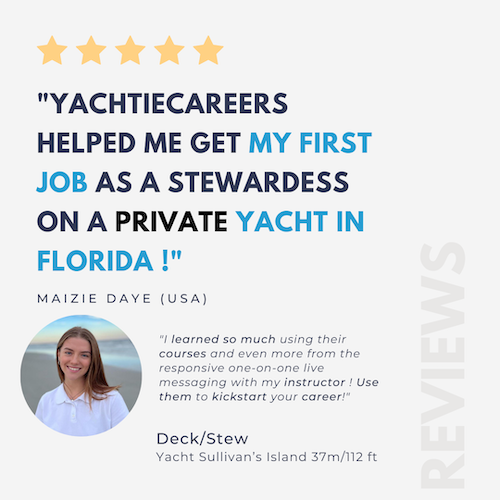
(5.0) Rating on Google Reviews
Book the full STCW Training week in the Mediterranean.

Deckhand Superyacht STCW Training
All you need to become a successful deckhand and get your first yacht job.
Yes, I want to start now and become Yacht crew

Stewardess Superyacht STCW Training
Where can i start working on yachts .
With Yachtie careers you can start online yacht crew training anywhere in the world, and then we custom make your package offering you hybrid online training with Basic Safety in your home country or booking the STCW with us in Split, Croatia.
Can I do Yacht Training online to start ?
Yes, it is the perfect way to start Yachting. We have specifically made this package for brand new crew looking to start, so that you can start without paying a huge training fee and still get the tools needed.
At the end of the training, you will get:
- Superyacht Introduction Online Certificate
- A custom plan on getting all your certificates that you are going to require for your position and location and get started with your instructor.
Can I work on board with the certificates I get ?
Yes! We have tailor made the packages so you get exactly what you need to be qualified to work on a Yacht. You also get the training and tools to work as a Stewardess and Deckhand on board a Yacht.
STCW Basic Safety Certificates
STCW Security Awareness Certificate
STCW PDSD Certificate
Food& Hygiene Level 2 CPA Certificate
Deckhand Course Certificate
Stewardess Course Certificate
This is IMO and MCA recognised and enables you to work on any Superyacht in the world.
You will also get a Superyacht Security Awareness Certificate and a CPD approved Food and Hygiene Level 2 Certificate and a Superyacht Course Certificate after completing our Yacht crew training package.
We will put it all on your CV when writing it for you.
What qualification do I need to work on a Yacht ?
To start with us you simply need a laptop to sign up and do the online yacht crew training course and your profile in the Online Superyacht Introduction package.
To work on board and get a yacht job, you need the following that you can book in our yacht crew training:
- Stewardess Training
- Deckhand Training
- ENG1 Medical Certificate
- Food and Hygiene Level 2
- STCW Security Certificates
- Superyacht CV to apply for jobs.
- STCW Training Certificates and Basic Safety
How much is a yacht stewardess/deckhand salary ?
A Yacht stewardess salary starts from 2300€ and with experience and the right yacht crew training and qualifications, yacht crew can earn up to 10000€.
A Junior Deckhand salary starts from 2300€ and with experience and the right yacht crew training and qualifications, yacht crew working on deck can make up to 10000€.
Should I do Yacht STCW Online or STCW Basic Safety ?
Both include mandatory certificates you need as qualified Yacht crew such as:
STCW Security courses and Food & Hygiene.
STCW Full also include Basic Safety training – 7 days training and accommodation with us in Croatia.
STCW Online yacht crew training you get everything that you get in STCW full – But the Basic Safety Training we will organise at your preferred location for you instead. This option is for you that want to book the Basic Safety in your hometown. Of course we will assist you with the booking and arrangements.
Do I get a job after the Yacht Crew Training ?
We write your CV, plan your job search and connect you to yachts and agencies in our network, so that you together with the other crew in our network together can get jobs faster.
How long does it take to get a Yacht job ?
This is completely up to you and how hard you are willing to work with during and after your yacht crew training with us to make it happen. We have a 10-step plan to get you on board within 40 days of signing up.
We have created Yachtie careers not only to get certified but to get your first superyacht job faster. That is why we have made the yacht crew training packages. You do not only get the certification, but we give you the CV, tools and guidance to maximise your chances acing your interviews and increase your superyacht job offers.
Does Yachtie careers help with finding a yacht job ?
We tailor make the training and certificates based on your position, location and preference to get all you need to be qualified to work and get a superyacht job.
In addition to this we give you the training and the tools with a Superyacht CV so that you can get job offers after the training!
What happens when I book yacht crew training ?
- You receive a full details for your yacht crew training
- You receive log in details and create a members profile with us for your yacht crew training
- We enroll you in the STCW training to become qualified to work on Yachts
- We organize your ENG1 and Medical certificate
- We write you a Superyacht CV to find your first Superyacht job
- You connect with your instructor and follow the 10-step plan on how to become yacht crew and find your first superyacht job.
Book your Superyacht training
Select your location in croatia or florida and become yacht crew online., follow the life of yachtiecareers crew.
- Partnerships
- Privacy Policy
- Terms & Conditions
- + 46 735895888
- [email protected]
Start on Yachts

Final 6 Training Spots remaining for Med-season 2024.Use free code “yachtie50” for 50€ free.
Get free yacht cv and yacht job offers

How To Become A Yachtie | How To Land Your First Yacht Job
How would you like to travel the world with no expenses while getting paid to do so?
Sounds too good to be true, but it’s not!
Working on superyachts, that is exactly what happens. You get paid a great wage all while traveling the world with no expenses.
Most readers have already heard about working for a cruise line, however, not many people know they can skip the crowded cruise ships and work on a Superyacht for the rich and famous.
If you have seen or heard of “ Below Deck ” then you already know all about the yachting industry.
With the popularity of this TV drama series, more and more people are trying to get into the industry.
But with more people applying for jobs each year, it is getting harder and harder to break into the industry. This is why I decided to write this, to help people like you on how to become a yachtie.
How To Get Into Yachting
Before you start your career in yachting, you’ll need to get your STCW 95 and your ENG 1. YOU CANNOT WORK ON A YACHT WITHOUT THESE.
The STCW 95 is a one-week basic training course that costs around $1000-$1500 depending on where you take it. To find a location near you go to the STCW 95 course .
This course covers basic firefighting training, first aid, and sea survival. You will be in charge of a multi-million dollar, even billion-dollar yacht.
They want to make sure you are wise and capable of taking care of it.
You will also need to get your ENG 1 before you can begin working on a yacht. It is a simple health exam to ensure you are physically fit and is entirely for safety reasons.
You can’t be out at sea and have health issues that might require emergency evacuation.
It is normally a good idea to get your ENG 1 while you are taking your STCW 95 course. There are only a handful of doctors that are permitted to assign you an exam.
They all tend to work from where the yachts are based and the exam will be in high demand.
The ENG 1 is usually around $100 – $150, and it only takes about 15 minutes, but it is REQUIRED.
For anyone interested in working for the deck department, it is a disadvantage if you are color blind.
If you are only wanting to go yachting for a year or two, this won’t be a problem. But, if you want to make this a career and work your way up to captain then you will not be able to do so.
You will be in the wheelhouse at night and doing watches so you’ll need to know the difference between red and green lights.
Not sure what you want to do on a yacht? Click here for the best entry-level jobs .
Also, be aware that yachting is a very old-school industry, and having visible tattoos might hurt your chances of getting a job. Although this is becoming less and less of an issue.
11 Tips On How To Become A Yachtie

1. Make a Kick-Ass CV
With more and more people joining the yachting industry, you have to make yourself stand out for an entry-level position.
A standard CV in the yachting industry includes a professional photo of yourself (Be sure to wear a white polo shirt ), nationality, date of birth, smoker/nonsmoker, tattoos, and previous work experience.
Also include hobbies, places you’ve lived, accomplishments, and what you do for fun.
You never know what will get you hired, it could be that time you climbed Kilimanjaro! If the first mate that is hiring has also done this, he will most likely put you in front of the line and call you first.
If you pass the phone interview and get along well with the crew, you will most likely get the job.
Canva is also a great place to go to get a great CV template to make yourself stand out
2. Dockwalk
Dock walking is like cold calling but in person. You have to get used to rejection in yachting, you might not be the right fit for one yacht but you will be the perfect fit for another.
DON’T take rejection personally and DON’T give up.
One of the best ways to get a job in yachting is by dock walking, talking to the crew, and asking if they have any day work.
After your day work, you never know what might turn into a full-time job. Yachting is all about networking.
For a full guide on dockwalking
3. Yachting Facebook Groups
Facebook is great these days for their group forums. Jobs are constantly being posted in Facebook groups so join as many as possible.
They are also great for keeping up-to-date with topics that are going on in the industry.
Joining one of these groups is a great way to find out information on How to become a yachtie or how to land your dream job.
Be sure to focus on groups for the area you are based in. If you are in Fort Lauderdale, it doesn’t make sense to join a crew Facebook group based in Antibes, boats want local crew.
If you are new to the industry, no one is going to fly you out to the boat.
Be aware of what you post in these groups, greenies are constantly ridiculed for foolish posts and stupid questions.
But if you are clever enough to post a creative or funny posting looking for work, it might even land you a job : )
Here are some great Facebook groups to get you started
- Yacht Crew Wanted
- Med Yacht Crew Jobs
- Yacht Chef Jobs

4. Daywork123
This is a great website for crew seeking work in South Florida, they are constantly posting jobs and day work. You can upload your CV and apply for jobs that are posted here.
If you post your CV on this website be awake and ready to work by 8am. You can get a phone call at any time and they likely want you to start work right away.
They say the early bird catches the worm, in yachting, it’s all about who can show up ready to work first.
However, I only recommend this website if you are legal to work in the US.
Immigration has been known to look for illegal workers here, and sometimes even set up traps. The last thing you want to happen is to get caught looking for work before your career even starts.
5. Drop Off Your CV At Local Yachting Spots
If you want to get a job on a Superyacht, it is best to go where the superyachts are based: South Florida, Antibes or even Palma.
Like I said before if you don’t have the experience, no one is going to fly you to the boat.
Wherever yachts are based, there are local yachting bars or uniform shops that are great for green crew to leave their CV’s behind.
Boat crews go there often when they are looking to hire.
If you are in Fort Lauderdale you can drop your CV off at Smallwoods, a crew uniform shop. If you are in Antibes then you can post them in the Blue Lady, a local yachting bar.
Put a copy of your CV or business card in these types of places.
Be sure to keep an eye on it, go in and move it to the front of the line if you are still looking for work.
It’s all about being at the front of the line if you want to get a job.
6. NETWORK with Superyacht Crew

I can’t tell you how important this one is, network, network, network…. You need to be social and likable to make it in yachting.
Not only are you going to be working with the same people every day, but you also live with them. They become your family away from family and you have to see them and get along 24/7.
If you are a person who likes your personal space, yachting is most likely not for you.
You might be traveling the world with the same 7 people for the next 2 years, you need to get along.
So network, and talk to everyone you meet or pass by because you never know where your first job will come from.
It could be as simple as talking to someone in line at the grocery store.
Or letting someone cut in front of you at a crowded bar that helps land you your first job.
7. APPLY, APPLY, APPLY
You are not going to get a job on a Superyacht unless you keep applying and sending out your CV. On average you should be sending your CV out at least 20 times a day.
Most likely you might only hear back from one or two of the boats, sometimes none.
But you can’t give up. You might not be the right fit for 100 yachts, but you will be the perfect match for one.
You just have to keep on applying until you land your first job.
Because you are technically not a yachtie until you get your first job.
8. Triton/ Social Superyacht Events
This comes back to networking. You have to get involved in the yachting community and go to local events in your area if you ever want to get a job.
Triton holds some great events frequently, so it’s a good idea to check them out and see what’s going on in your area.
Networking is key if you ever want to get a job. Talk to captains, add people on Facebook and most importantly be friendly and social. No one wants to hire an unfriendly crew member that isn’t social.
9. Airdrop Your CV or Business Cards
Ok, I had never made b usiness cards, but they are truly effective. Nothing is worse than being caught without your CV when someone is looking to hire and you are the perfect fit.
Always have business cards in your pocket, they are much easier to hand out than your CV.
Another tip is to have your CV on your phone ready to Airdrop or email. Yachting is a fast industry.
When a boat needs a crew member to start, it was most likely yesterday. The person who can start the fastest is usually the one they will hire.
There are hundreds if not thousands of crew members looking to join the industry and everyone is replaceable.
10. Yachting Crew Houses
Stay in a crew house when looking for work, this will give you a great opportunity to network.
Think of a hostel except everyone staying there is in the industry, in-between jobs and usually looking for work. I was able to score my first job from a crew house.
A girl in my crew house was fired from a boat because she was unable to cook.
Since I was cooking she recommended me and voila! That is how I got my first permanent job.
Check out Facebook to find a crew house in your area. If you are in Fort Lauderdale I highly recommend Ancorhed Crew House .
If you keep doing all of the above until you land your first permanent job, I promise you will get a job on a superyacht.
Keep trying and don’t give up. I promise you will get a job if you follow these steps.
It is a dream job for some. A job that lets you travel the world making money while having no expenses.
All of your expenses on the yacht are paid for! Including your shampoo and deodorant.
You will also have all of your meals cooked for you by an amazing chef, and your laundry washed, ironed and folded.
It is the perfect job for anyone looking for an alternative lifestyle, to save a ton of money, and travel.
Downsides Of Working On Yachts
Once you are a yachtie, you will realize that is does have its downsides.
You have no personal space or private life, you are at the beck and call of the owner 24/7 year-round.
So you can throw out planning for anything or going home for family events.
It is unstable. Depending on the yacht, you can be let go from a position for any reason.
You will also have to be off the boat within hours ( luckily they do have to pay for your ticket home).
Also, it is a very sexist industry.
If you can’t handle that, don’t join the industry.
Besides modeling, it is the only industry that not only allows but requires you to put a picture on your CV.
There are stories of girls getting fired because of their hair color, they were too short, or the owner’s wife thought they were too pretty.
You have very different working rights than you are used to. Forget about overtime. You will be working long hours, holidays and weekends.
If you don’t like it they will simply find someone who does. At times you will work 18 hours or more a day, sleep very little, and you won’t step foot on land for weeks.
However, without expenses, you should be able to save a lot of money. When you are working all the long hours you can’t spend your paychecks.
But when you do have to time off you are able to do some awesome things.
You will meet some amazing people. Collect stories that your friends back home will never believe.
It’s not for everyone, but if you can deal with the downsides of it, it is completely worth it.
Thanks for reading. I hope you enjoyed this article on “How to become a yachtie”
So are you ready to get a job on a Superyacht or are you looking for other cool jobs to do aboard ?
What Qualifications Do I Need To Work On A Superyacht?
You only need two qualifications to work on a Superyacht. The first is your STCW 95 a one-week training course and the other is your ENG 1 a psychical medical exam. These are the basic qualifications for entry, but there are more courses you can do to better your odds of getting a job.
Is It Easy To Get A Job On a Superyacht?
Yes! It is easy to get a job on a superyacht, it just takes a little determination. Females tend to have better luck starting out than males, but as long as you don’t give up you will land yourself a job on a superyacht.
How Much Do You Make Working On A Superyacht?
You normally make around $3,000 – $3,500 as an entry-level yacht employee. This does not include your free room and board, as well as all your toiletries and uniforms that are paid for. Salaries will go up every year that you continue to work in the industry.
Related Content
- What Questions to Ask Before Joining a Yacht
- How to Become a Yacht Stewardess
- How to Become a Yacht Chef
About The Author
Megan Kulluk
Related posts.

Guide To Dock Walking

Yacht Chef, How To Become One!

Best Questions To Ask Before Joining A Yacht
18 thoughts on “how to become a yachtie | how to land your first yacht job”.
Thank you for posting
I would like to know more about the course prices and if you may have accommodation for learners
It all depends on where you take the course, as it is offered all around the world. However, it is normally around $1000. You can also normally find a room to rent near where the course is being held for around $200 a week.
Very good blog
I would love to work in a superyacht
What do you do if 1. you are not a US citizen (for jobs in Fort Lauderdale). 2. if you don’t live in Fort Lauderdale or near a dock?
You don’t have to be US citizens, if you are able to work in Europe you can also try Antibes.
Hie Peter is there any age limit
Nope, no age limit although the average age is 20’s-30’s.
Can older people work. There age 61
Generally, it is a pretty young industry. Especially when you are starting out and have no experience. I think they would really struggle to find work, especially if they are just getting started.
Please I would love a job please
Do the steps I write about in this post and you will get one : )
good day, can I apply as a crew?
First, you need to get your STCW, and after that you can apply.
Hi my name is sasha from south africa 19years old of age looking for job with no experience
You should totally get your STCW 95 and apply to work on the yachts.
Leave a Comment Cancel Reply
Your email address will not be published. Required fields are marked *
Save my name, email, and website in this browser for the next time I comment.
- EXPLORE Random Article
How to Work on a Yacht
Last Updated: June 4, 2023 References
This article was co-authored by wikiHow Staff . Our trained team of editors and researchers validate articles for accuracy and comprehensiveness. wikiHow's Content Management Team carefully monitors the work from our editorial staff to ensure that each article is backed by trusted research and meets our high quality standards. There are 8 references cited in this article, which can be found at the bottom of the page. This article has been viewed 3,257 times.
Working on a yacht is a unique, fun, and potentially lucrative way to earn a living. While it can be intimidating and challenging to get a job on a yacht, having the opportunity to work while traveling can make it well worth it. To begin working on a yacht, you can get an entry-level job that requires little to no prior yachting experience. Once you are more experienced in the yacht business, you will be able to work on a yacht in a more advanced and specialized role.
Getting an Entry-Level Job on a Yacht

- Junior deckhands generally have a good work ethic, positive attitude, ability to learn on the job and follow directions, a professional appearance, and work well with a team. [2] X Research source
- Junior deckhands are responsible for cleaning, polishing, and waxing the yacht, assisting the bosun and first mate with maintenance, and helping with general yacht operations, including line handling, navigation, passenger safety, and water sports. [3] X Research source
- Junior deckhands make approximately $27,000 per year. [4] X Research source

- While not always a requirement, having a watersports certification, fishing knowledge or expertise, and/or carpentry skills can help you get a job as a deckhand on a yacht. Having one or more of these skills may also help you earn more money. [7] X Research source
- Much of a deckhand’s work is performed on the outside of the boat. Therefore, as a deckhand, you would be doing a lot of manual labor outside. This can be helpful to keep in mind when deciding if working as a deckhand is right for you.
- Deckhands usually make between $27,000 and $55,000 per year.

- Boat attendants are responsible for maintaining the cleanliness of the ship’s interior, helping with guest management and entertainment, and assisting the crew in maintaining the safety of everyone on board. [9] X Research source
- Successful boat attendants are high-energy and good entertainers, exhibit proper hospitality etiquette while on the job, and are committed to maintaining yacht cleanliness. [10] X Research source
- Entry-level ship attendants usually make around $40,000 per year, while more experienced workers can make up to $100,000 per year on a large luxury yacht. [11] X Research source

- One of the keys to working as a chef on board a yacht is the ability to get creative with your ingredients. Once you leave the dock, you will likely only have access to the ingredients that you have on hand.
- When considering working as a chef on a yacht, it can be helpful to take into consideration the size of the yacht, the number of people typically on board, and the conditions in the kitchen. As the chef, you will be responsible for making most (if not all) the food for everyone on board, meaning that you may be spending most of your time in the kitchen.
- If you have experience or professional training as a chef, you can make between $52,000 and $100,000 per year on a yacht, depending on your level of training and the size of the yacht. If you do not have any prior experience, you can make between $36,000 and $75,000 per year as a chef on a yacht. [12] X Research source

- Crewnetwork.com and luxyachts.com are both popular yacht crew online agencies.

- If you are working on a yacht abroad, you may need to acquire a work visa. Contact your yachting company or owner to see if this applies.
Working in an Advanced Position

- Bosuns often have a specific area of expertise that helps them land the job and makes them a more valuable member of the crew, such as advanced woodworking, varnishing, rigging, or watersport expertise.
- Bosuns generally make between $36,000 and $100,000 per year.

- On smaller yachts, there is usually just one mate, called the first mate. On larger yachts, however, there may also be a second mate and, possibly, even a third mate. The second and third mates also have extensive experience, yet generally a bit less than the first mate.
- In the event of an emergency, or if the captain needs to take a leave, the mate is responsible for taking over the captain’s duties. As a result, mates need to have any required licenses or certifications for their specific type of yacht.
- Mates on a yacht typically make at least $48,000 and up to $100,000 per year. [14] X Research source

- Yacht captains must have a high school diploma or GED.
- To be a yacht captain, you will need to take a captain’s license course and pass the licensing exam.
- The captain of a yacht typically makes a minimum of $65,000 per year. Captains can make well over $200,000 per year working on a larger yacht. [16] X Research source

- Most engineering positions are available on larger yachts called superyachts. While smaller yachts will hire a yachting engineer for maintenance, they do not usually have a permanent engineer that works on-board. [18] X Research source
Expert Q&A
- Larger luxury yachts may also hire beauticians, pursers, and/or managers to provide luxury services to their clientele. [19] X Research source Thanks Helpful 0 Not Helpful 0
- You can find job postings for positions on yachts on general job search engines, such as Indeed and ZipRecruiter, as well as specialized yachting job search engines, such as yotspot.com and yaCrew.com. Thanks Helpful 0 Not Helpful 0
- When looking for a job on a yacht, it can be helpful for you to already have completed your Standards of Training, Certification, and Watchkeeping (STCW) certification course. This certification is not always required to work on a yacht, but it can help make you a more desirable candidate. Thanks Helpful 0 Not Helpful 0
You Might Also Like

- ↑ https://www.luxyachts.com/crewpositions/jrdeckhand
- ↑ https://www.luxyachts.com/crewpositions/deckhand
- ↑ http://www.workonayacht.com/index.php/official-yacht-stewardess-job-descriptions-salaries/
- ↑ https://www.crewfinders.com/yachtcrewsalaries.shtml
- ↑ https://www.luxyachts.com/crewpositions/mate
- ↑ https://www.luxyachts.com/crewpositions/captain
- ↑ https://www.crewnetwork.com/Yachting-Jobs/engineer.aspx
- ↑ https://whereintheworldisnina.com/working-on-superyachts/
About this article

Did this article help you?

- About wikiHow
- Terms of Use
- Privacy Policy
- Do Not Sell or Share My Info
- Not Selling Info
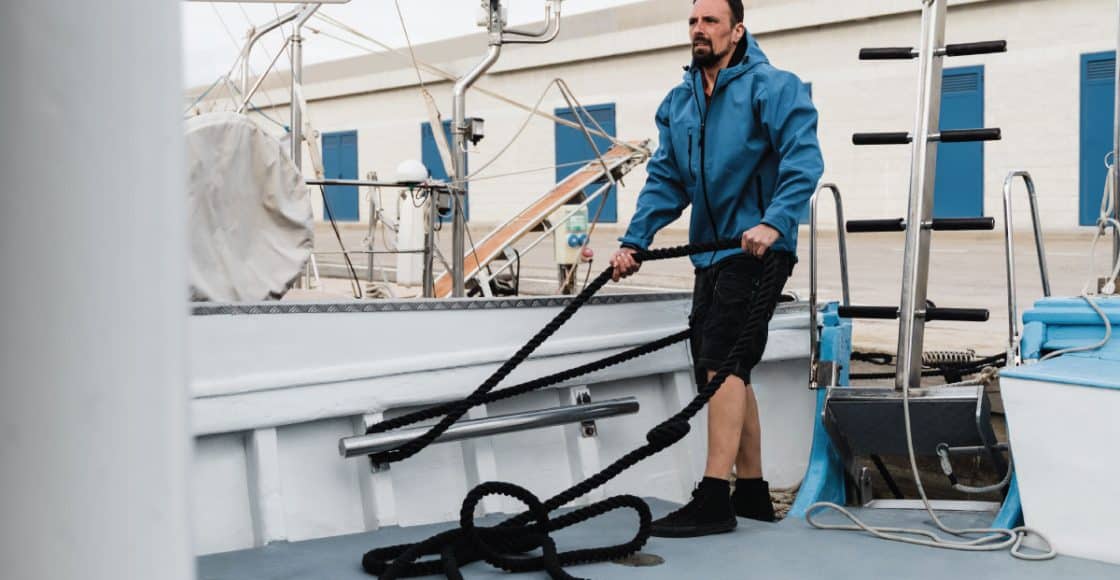
How to Work on a Yacht

Table of Contents
Working on a yacht is honest and good work; it also comes with many amazing perks:
- A one-of-a-kind workspace
- The ability to make industry connections
- Opportunities to move up
Ultimately, how to work on a yacht involves tremendous dedication, along with a little luck. We can set you on the right path here and now.
Browse for yachts for rent on Boatsetter

1. Do your homework
Just as you had required reading while in school, work on a yacht requires understanding a lot of information about deck duties. A few books and websites can (pardon the pun) steer you in the right direction.
The Insiders’ Guide to Becoming a Yacht Stewardess and its companion website workonayacht.com are both by Julie Perry, a stewardess-turned-yacht-marketing consultant. Also check out crew -centric magazines like Dockwalk and newspapers like The Triton , along with their related websites.
2. Get your CV in order
A CV—curriculum vitae—is your resume and should summarize all relevant experience plus transferrable skills. Perry says if you grew up waterskiing or boating, be sure to mention how long you’ve been doing it. Transferrable skills, meanwhile, range from house painting to woodworking and even being a nanny to waiting tables.
Work on a yacht can and does involve maintenance skills and hospitality skills. “You really need to sell yourself on paper, or you won’t stand out,” she says!
3. Go where the yachts are
Fort Lauderdale is the Yachting Capital of the World due to the large yachts that frequent its waters and yachting businesses headquartered there. Fort Lauderdale is also the number-one location for proper training (more on that below) and housing while you job hunt.
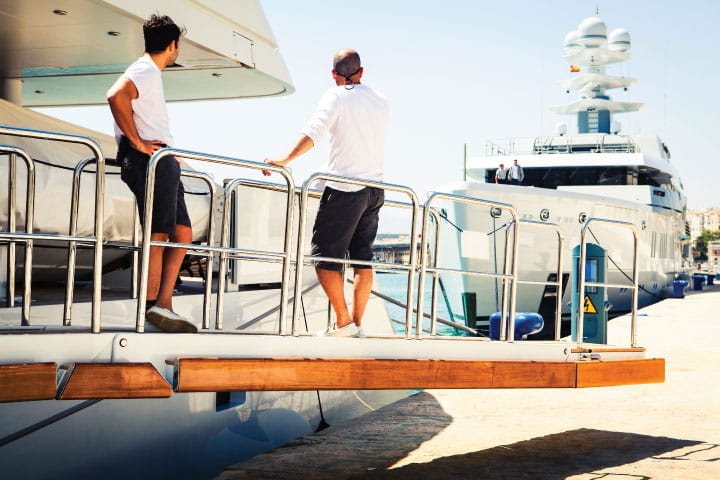
4. Find a trainer
How to work on a yacht begins and ends with training. Everyone, whether you want to be a deckhand, a chef, or a steward/stewardess, needs STCW training at a minimum. STCW ( Standards of Training and Certification of Watchkeeping ) is internationally required for every seafarer, in fact.
Briefly, it certifies that you have a basic understanding of safety hazards at sea and can respond properly in emergencies. Bluewater and Savvy Maritime Academy are two well-respected training providers in Fort Lauderdale. Additionally, you need an ENG1 medical certificate, proving you’re fit to work at sea.
Obtain this before enrolling in training in case a medical condition could preclude you from working onboard . Find doctors who provide the exams and certificates on yachting-pages.com , a valuable resource for captains, crew, and the industry.
5. Go beyond the basics
“It’s going to make such a difference in your understanding of the industry and your confidence level,” Perry says, plus increase your chances of landing a job. She adds that most yachts and crew-placement agencies require a certificate of proficiency in security, for example.
If you want to be a deckhand, she continues, consider obtaining a tender-driving certificate. Stewards and stewardesses often enroll in wine and bartending courses, meanwhile.

6. Save money for costs
Perry strongly advises having $6,000 to $7,000 to cover at least two months’ worth of expenses in Fort Lauderdale. These include not just housing (which you can find on yachting-pages.com) but also training, transportation, and meals.
A five-day STCW basic course costs over $1,000, and an additional one-day proficiency in security course is $300.
7. Networking is key
Once you get your STCW, “it’s networking, networking, networking,” Perry says. Online bulletin boards like daywork123.com post new opportunities daily—which can go quickly, so check and register early. Another source, meridiango.com , lets you register, upload your CV, and record a video, then interview via their portal.
Training schools often lend a hand with job hunting, too. Old-fashioned dockwalking—literally walking the marinas—can land you a job as well, as can frequenting places where crewmembers hang out at night.
8. Know the rules
How work on a yacht involves adhering to strict rules about not just safety but also privacy. The larger the yacht, the more the owners and guests prioritize discretion. “If you think you’re going to be a social-media influencer while traveling around on a 200-footer in St. Tropez, forget about it,” Perry warns. Some yachts don’t permit posting pictures or details about the yacht and their movements on social media.
About Boatsetter
Boatsetter is a unique boat-sharing platform that gives everyone — whether you own a boat or you’re just renting — the chance to experience life on the water. You can list a boat , book a boat , or make money as a captain .
Put your boat to work— Start earning an avg. of $20K yearly with Boatsetter

A journalist with more than 30 years’ experience, Diane M. Byrne is the owner of MegayachtNews.com, a daily website educating American superyacht owners, buyers, and their circles of influence about the leading builders, designers, cruising destinations, and more. She founded the website in 2007 as the first, and still the only, American-focused online media outlet exclusively covering this market. It features all-original content, for real stories of real interest.
Diane is additionally one of the most-sought-after journalists for expert editorial coverage and commentary about not only superyachts, but also general boating and yachting. Her byline appears in Boatsetter.com, DiscoverBoating.com, and the magazines Luxury Guide, Ocean, Yachting, and Yachts International.
Additionally, Diane is the Chair of the U.S. Superyacht Association, having been on the Board of Directors since 2015. Outside of yachting, she’s a trustee of Sempre Avanti, a non-profit resource supporting Italian and Italian-American individuals, businesses, and organizations in the United States and Italy.
Browse by experience

Explore articles

Running Out of Gas on a Boat: What Now?

7 Ways for Boaters to Celebrate World Ocean's Day

Boatsetter, in Partnership with Suntex, Continues Breaking Down Barriers for Entrepreneurs on the Water

Everything You Need to Know about Lake Lanier Boating
How to start your Career in Yachting

Are you looking to change your career and work on a Yacht? Jobs at sea such as deckhand, stewardess or a chef are extremely rewarding and our specialist recruiting team at Viking Crew can help you with some essential tips to make your dream career come true.
Creating your Yachting CV
Your CV is your selling tool. It is the first impression the Captain/Management company will have of you and you will need it to make an impact in such a competitive industry.
• Ensure you include a smart, professional head and shoulders photograph • Double check all contact details are up to date, including a professional email address • Include all relevant work experience, starting with your most recent • Keep an easy to read layout • Include all relevant Qualifications • Include all relevant hobbies and interests including watersports, team sports etc • Provide up to date contact information for x 2 verbal references • Keep CV to a maximum of 2 pages. Make it concise and ensure it sells YOU to the potential employer!
Our yacht placement team are always on hand to assist with enhancing your CV and chances of gaining a suitable role within the industry.
What Training/Certification will I require prior to joining the industry?
To start work in the yachting industry, the main certificates requested by the vessel or management company are usually:
• STCW Basic Training - The aim of the course is to give seafarers the essential education and training in Personal Survival Techniques, Fire Prevention and Fire Fighting, Elementary First Aid and Personal Safety & Social Responsibilities, with an additional Proficiency in Security Awareness • ENG1 or Equivalent Seafarer Medical- This can be completed at any MCA approved doctors' surgery .
We also receive many requests for:
• Proficiency in Designated Security Duties • Powerboat level II
Any additional relevant courses that could benefit yourself or the yacht. These could include, but not limited to:

• VHF Radio • RYA Radar • RYA Competent Crew • RYA Tender Operator • PWC Personal Watercraft Profiency • PWC Personal Watercraft Instructor Course
• Food and Hygiene level II • Silver Service Certification • Floristry Training • Mixology/Barista Training • Wine Knowledge • GUEST Approved Stewardess

Dock Walking
Yachting is a competitive industry to break into. There are large numbers of crew who are keen to gain their first experiences in the industry. Most entry-level crew gain their first experiences by Dock Walking. This is essentially, travelling to “yachting hubs” such as South of France or Palma and walking the dock. This will involve approaching and speaking with the crew (where possible) with the aim of securing some day work or even a permanent position.
How shall I prepare for my yacht Interview?
Yacht interviews will usually be held face to face if nearby the vessel or more commonly, by telephone or video call. We recommend:
• Be on time • Impeccable presentation • Be prepared, try to do some research, where available • Show commitment to the boat • Ensure you get across ALL relevant experience for the role that you are interviewing for but show willingness to learn and expand your knowledge and experience • Listen to the interviewer • Treat all interviews, including virtual, as if they are face to face • Always stay professional • Have any questions prepared prior to interview.

How to apply through Viking Crew?
• You can register with Viking Crew by creating an online profile here • You can apply directly for any roles on our website through your profile • Should you require any further information on the roles available please contact the placement team by phone, or email. • Please make sure you keep all your information up to date in the system so our team is aware of your availability, location, and experience so we can contact you regarding suitable openings.
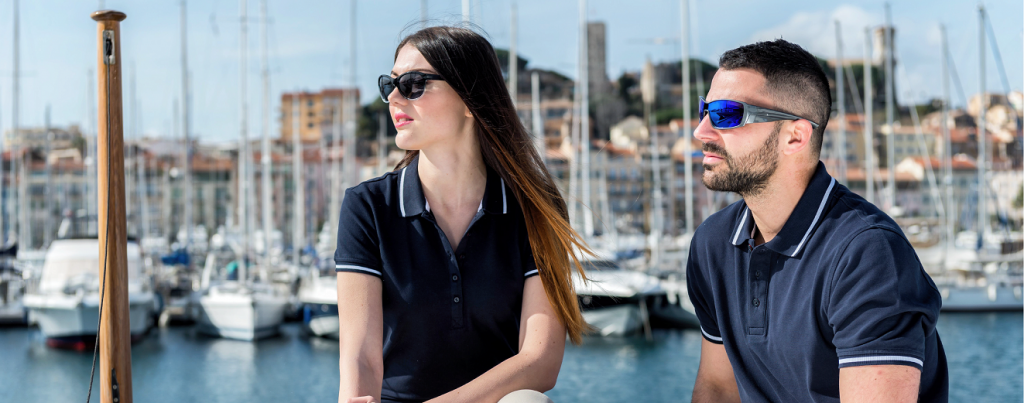
Sign Up For News & Updates
- Terms & Conditions " required=""> I agree to your Terms & Conditions *

- Industry Updates
- General Boating News
- Something Else
- I am happy to receive email updates from Viking Crew
- I agree to your Terms & Conditions
Ready To Apply?
Apply with 1 click with your viking crew account..
Don't have one? Click below to register and complete your profile
Email Address
Remember Me

Register With Viking
Search saved.
Manage your search preferences in your user profile
Thankyou for your message.
We aim to respond to all queries within 24 hours. Still looking for the perfect job? Start a search now
Thank you for signing up, keep an eye on your inbox. Ready to start your job search?
- Our Clients
- Our Offices
- Associations & Accreditations
- Crew Your New Build Yacht Projects
- Yacht Services Overview
- Funding and Grants
- Maritime Labour Convention (MLC)
- Green Crew Pathway
- Mental Health & Wellbeing
- Women in Maritime
- MCA Wellbeing at Sea Tool
- Newsletters


$10k/mo On The Side — Sharing What You Already Know

If you’ve ever thought about traveling the world while getting paid (and mingling with the rich and famous on the side), Hugo Ortega’s side hustle story may appeal to you.
After spending 9 years working as a yacht crew member and captain, traveling to over 60 countries, the former engineer decided to turn his niche career experience into a fast-growing online course business— Superyacht Sunday School.
Now, it has grown into a full-time business earning $10K/month .
(Sign up for Hugo’s free superyacht training here !)
Tune into Episode 602 of The Side Hustle Show to learn how to:
- build your audience with free valuable content
- turn followers into email subscribers
- boost sales through live virtual trainings and webinars
- monetize your expertise with courses, one-on-one mentoring, and memberships
A Stumble into Yachting
Starting small as a service provider, building the signature course offering, short-form videos for marketing, user-generated content, influencers, and continuity programs, branching into other revenue streams, unforgettable experiences as yacht crew, what’s next for hugo, hugo’s #1 tip for side hustle nation, episode links, serious about making extra money.
- Cantaloupe — Join the 30,000+ entrepreneurs who rely on Cantaloupe to run and grow their vending businesses!

- Indeed – Start hiring NOW with a $75 sponsored job credit to upgrade your job post!

- Airbnb – Start an Airbnb business and earn money as an Airbnb Host!

- Monarch Money — Get an extended 30-day free trial of the top-rated personal finance app!

Hugo didn’t grow up dreaming of working on boats. In fact, he admitted he couldn’t even swim when he first discovered the yachting industry.

It happened by chance while he was backpacking through Southeast Asia and met someone working as a yacht crew member. The more he learned about the job and lifestyle, the more appealing it became—especially the opportunity to get paid to travel the world.
As Hugo shared, “It’s really common for people to have envy towards your job and ask you, ‘How did you get into it?'” He was constantly fielding these kinds of questions from others interested in breaking into yachting.
Hugo thought nothing of it at first. He’d explain the basics of getting started, certifications needed, tips on finding jobs, etc. But then he started to notice a trend of people attempting to work online and leverage their existing skills and knowledge.
That’s when the light bulb went on for Hugo. He thought, “Maybe there’s something I can do on the side.”

In late 2022, Hugo began putting together some basic resources to help aspiring yacht crew members. This included PDF guides on how to create an effective CV/resume, a list of top crew recruitment agencies , and checklists outlining the steps to get started.
To get things going, Hugo turned to Facebook groups related to yachting and began engaging with the community, answering common questions, and adding value wherever he could.
Anytime someone asked a common question, Hugo made sure to answer it thoroughly. At the end, he’d say something like “If you want more resources on this topic, I’ve got a great guide here,” and include a link to opt-in to his email list. He also uses the software ManyChat to automate his audience engagement.
This was the “free upfront, paid content later” type of funnel. By offering valuable free content, Hugo could gain trust, expand his email list, and prepare for future paid offers.
Pretty soon Hugo had his first $299 sale for a basic package that included a 1-hour phone consultation and those same PDF guides he had offered as opt-in incentives. It was a simple proof of concept, but it showed there was real revenue potential.
Bit by bit, the email list began to grow. He uses a visual email builder called Flodesk for a more expensive/luxurious feel, as he claims.
He then constantly paid attention to which lead magnets were getting the most downloads, which content resonated best through open rates, and what people’s most burning questions were.

The current main offering from Super Yacht Sunday School is priced at either $997 for full upfront payment, or $99 per month for 12 months.
But as Hugo explained, “But if you go through the webinar sequence and funnel, that’s when I offer it pretty much at a 50% discount.” So students can get the full course for either $499 upfront or $99 per month for 6 months only.

Using a limited-time discount required Hugo to adopt some new software to handle the “open/close cart” expiration timing. That’s where the Deadline Funnel tool came into play to enforce that scarcity.
The tool that really helped open the revenue floodgates? Switching from a pre-recorded evergreen webinar to live weekly training sessions.
Hugo said this single shift doubled his webinar conversion rates. Now, instead of people watching a pre-recorded pitch at their leisure, they had to show up at a designated date and time for Hugo’s real-time training session.
By adding some artificial scarcity and demand, it created better shows, more engagement, and ultimately more course sales.
Hugo cited cheap or free marketing strategies as critical to his exponential revenue growth in 2024. That includes organic traffic through short-form videos on Instagram and TikTok .
The videos follow a similar pattern of catchy one-line hooks followed by simple cuts of life on a superyacht.
Some examples:
- “This is how much money you can make working as a yacht crew.”
- “Here’s how much a superyacht captain makes per year.”
His best performing video with over 1 million views and counting is a short clip of Hugo on a yacht posing in different crew positions with text displaying those jobs’ earning potential.
@superyachtsundayschool How much do yacht crew actaully make? #salery #howmuch #crewtraining #superyachts #fyp #yachties #belowdeck #industry #luxury ♬ Summer day – TimTaj
Short videos under 15 seconds seem to be the sweet spot for engagement and views according to Hugo. The videos are designed to attract eyeballs to his free lead magnets and eventually to his paid training offers.
On the SEO front, Hugo has started expanding into long-form blog content as well. This involves taking some of his popular Instagram posts and spinning them into deeper “how-to” style articles to build his website’s authority and search rankings.

Of course, these blog posts include opt-in offers and calls to action to join Hugo’s email list and get more free training from him.
And as an advanced tactic, Hugo has started experimenting with paid Facebook ads , specifically targeting members of big yachting enthusiast groups on Facebook.
He uses a tool called LeadEnforce that can combine the audiences of up to 10 separate Facebook groups into a custom list to upload to Facebook for ad targeting.
Though he admits these are still cold audiences compared to his existing email list and followers, Hugo says he’s acquiring new leads through Facebook ads for $1-$1.25 each, which seems promising so far.
Beyond his organic and paid marketing efforts, Hugo has found ways to leverage other people’s audiences and influence too.
For one, he’s been working to build partnerships with cast members of the popular TV show Below Deck featuring real-life superyacht crews and owners.

The goal is to have these influencers co-host trainings and events to cross-promote and tap into their large followings on social media (which can exceed 1 million fans in some cases).
Hugo is also starting to source user-generated content from his successful students to build social proof and case studies. The plan is to leverage these stories and transformations in an upcoming podcast currently in the works.
Another new frontier for Super Yacht Sunday School is creating paid continuity/membership programs to serve existing industry professionals.
Currently in a testing phase with a small group paying $59 per month , Hugo envisions building out more advanced crew training and development resources on an ongoing basis.
The tech tool he’s using for the community and course aspects of this premium membership is Hearbeat.chat .
Beyond just helping people get their first yacht crew job, this program would serve as a lead nurturing channel to continue advancing their skills and knowledge over time.
The online education piece was just the start for Hugo. Given his extensive industry expertise and connections, it was a natural pivot to also offer staffing and recruitment services for yacht owners.
Through some nice positioning and branding, Hugo started getting inquiries from yacht owners looking for crew. And as he explained, “Every time you place crew onto a yacht, as long as they stay at least 3 months, you get 1 month’s salary paid out also to you.”
Now Hugo has another income stream by placing his own students on crews after certifying them through his training programs.

One of the perks of working in yachting is getting to meet ultra-wealthy individuals and occasional celebrities like Jon Bon Jovi, George Lucas, and Pharrell. Though the “star factor” wears off as it becomes your everyday life and work environment.
Hugo claims that celebrities are actually more down-to-earth than you’d expect when on vacation.
He also had his share of wild experiences like getting caught in powerful storms during Atlantic crossings where the entire boat felt like it was going to capsize.
The luxury yachting world is full of surprises, but owners can simply postpone trips if conditions look too risky since they have the flexibility that cargo ships don’t.
Looking into the future, Hugo sees other opportunities to further modernize and innovate in the yachting industry through tech products and services:
“I feel like there’s a lot of antiquated practices, even with recruiting , where it’s just people emailing each other and saving PDFs,” Hugo said. “I want to automate and show that a small online entrepreneur can really take this by storm and make it better.”
Sounds like there’s potential for Hugo to develop some sort of “Upwork for yacht crews” style recruitment platform or marketplace.
“Just don’t give up.”
- Superyacht Sunday School
- Free Super Yacht Training
- Deadline Funnel
- LeadEnforce
- Hearbeat.chat
- Super Yacht Sunday School Instagram
- Super Yacht Sunday School TikTok
- Super Yacht Sunday School Blog Content
- Start Your Free $500 Challenge . My free 5-day email course shows you how to add $500 to your bottom line.
- Join the free Side Hustle Nation Community . The free Facebook group is the best place to connect with other side hustlers and get your questions answered.
- Download The Side Hustle Show . My free podcast shares how to make extra money with actionable weekly episodes.

The award-winning Side Hustle Show is a Top 10 Entrepreneurship podcast with over 1,200 5-star ratings!
Listen in your favorite podcast app or directly in your browser.

Like That? There's More!
Join the 100,000 who get my best stuff via email.
I'll also send you my free guide: The 5 Fastest Ways to Make More Money .
You're in! Make sure to check your email (including spam/promotions) for your free welcome gift.

About the Author
Nick Loper is a side hustle expert who loves helping people earn more money and start businesses they care about. He hosts the award-winning Side Hustle Show, where he's interviewed over 500 successful entrepreneurs, and is the bestselling author of Buy Buttons , The Side Hustle , and $1,000 100 Ways .
His work has been featured in The New York Times, Entrepreneur, Forbes, TIME, Newsweek, Business Insider, MSN, Yahoo Finance, The Los Angeles Times, The San Francisco Chronicle, The Financial Times, Bankrate, Hubspot, Ahrefs, Shopify, Investopedia, VICE, Vox, Mashable, ChooseFI, Bigger Pockets, The Penny Hoarder, GoBankingRates, and more.
Usually Hustling, Occasionally Social

The Company About Contact Books Advertise Media
Free Resources Blog Community $500 Challenge Personalized Playlists Side Hustle Quiz
The Fine Print Terms of Use Privacy How We Make Money CCPA Do Not Sell My Personal Information As an Amazon Associate, we earn from qualifying purchases.
Sean 'Diddy' Combs allegations: Timeline and what to know
Sean “ Diddy ” Combs has been hit with a wave of civil lawsuits in recent months and is now a subject of a federal investigation, sources have told NBC News.
Federal agents this week executed searches of Combs’ properties , where guns were found, and his phones were seized at an airport as part of a warrant issued from the U.S. District Court for the Southern District of New York, law enforcement sources have said.
Since November, Combs has been hit with five lawsuits in New York accusing him of sexual assault, sexual trafficking and engaging in other criminal activity. Combs has denied all of the allegations, calling them sickening.
A source familiar with the matter told NBC News that at least four people have been interviewed about allegations of sex trafficking, sexual assault and the solicitation and distribution of illegal narcotics and firearms.
Aaron Dyer, an attorney for Combs, described the raids this week as a “gross overuse of military-level force.” Neither Combs nor any of his family members have been arrested, Dyer noted in his statement.

Here are the lawsuits that were filed against Combs prior to the raid. Combs has denied all of the allegations individually through statements by his representatives.
November 2023: Cassie and two others file suit
The singer Cassie, Combs’ former romantic partner, shocked many in November when she filed a civil suit against Combs alleging that the music mogul sexually and physically abused her during the course of their relationship. She filed her case on Nov. 16 under New York state’s Adult Survivors Act, which gave adult victims of sexual violence a one-year window to file civil claims regardless of the statute of limitations.
In the suit, Cassie alleged that Combs raped her, beat her in fits of “uncontrollable rage” and exerted a “tight hold over her life.” She alleged that he would force her to engage in sex acts he called “Freak Offs” with other men, often sex workers whom he’d pay to travel with them, while he watched.
The abuse ranged from 2007 until Cassie left him in late 2018, the suit said.
Combs vehemently denied the allegations from Cassie, whose full name is Casandra Ventura. They settled the suit a day after it was filed.
Joi Dickerson-Neal said Cassie’s lawsuit inspired her to come forward and file a suit against Combs on Nov. 23, a day before the Adult Survivors Act was set to expire.
Dickerson-Neal said that Combs drugged her, sexually assaulted her and recorded the assault without her knowledge while she was a student in 1991. She agreed to have dinner with Combs on Jan. 3, 1991, in Harlem while on winter break from Syracuse University, according to her suit.
It was there that Combs “intentionally drugged” her and then took her to a place where he was staying, the suit said. Dickerson-Neal said she “lacked the physical ability or mental capacity to fend Combs off” as he sexually assaulted her.
She later learned from a male friend that Combs had filmed the assault and showed it to other people, the suit said. Combs denied her allegations.
On the last day of eligibility under the Adult Survivors Act, Liza Gardner filed a lawsuit accusing Combs of sexually assaulting her when she was 16 years old.
Gardner alleged that in either 1990 or 1991 she and a friend met Combs and R&B singer Aaron Hall at an event held by MCA Records in Manhattan. After the party, she was invited back to Hall’s apartment with Combs, the suit said, and the two offered her drinks throughout the night.
Combs then coerced her into having sex, the suit said, leaving Gardner “shocked and traumatized.” Hall barged into the room after Combs was done, pinned her down, and sexually assaulted her, according to the suit.
Hall did not return NBC News’ request for comment on the lawsuit. Combs denied Gardner’s allegations in a statement through his representative.
December 2023: Jane Doe says she was gang-raped at 17
Then in December, a Jane Doe filed a lawsuit alleging that she was gang-raped and sex-trafficked by Combs and Harve Pierre, a former longtime president of Combs’ record label. The unidentified woman said the assault happened in 2003, when she was 17 and Combs was 34.

According to the suit, she met Combs and Pierre at a lounge in Detroit and Combs convinced her to travel with them on a private jet to New York City. Before they left the lounge, the suit said, Pierre smoked crack cocaine and forced Doe to perform oral sex on him.
Doe was taken to a studio in New York City, where Combs, Pierre and a third defendant plied her with “copious amounts of drugs and alcohol,” the suit said. The three men took turns raping her in a bathroom at the studio after she was too inebriated to consent, according to the suit.
The men allegedly left her on the bathroom floor once they were done and she was flown back to Michigan, the suit said. Combs denied the assault allegations and Pierre called the suit “a tale of fiction.”
February 2024: Rodney Jones accuses Combs of ‘RICO enterprise’
In February, a man named Rodney “Lil Rod” Jones alleged in a federal suit that Combs and his associates engaged in “serious illegal activity.”
Jones worked as a producer on Combs’ latest album, but also lived and traveled with him from September 2022 to November 2023, according to his lawsuit. He alleged that during that time he was sexually harassed by Combs, pressured to engage in sexual acts, forced to procure sex workers for Combs and witnessed Combs giving drinks laced with drugs to people at parties.
The suit said that Combs required Jones to “record him constantly,” which resulted in Jones obtaining hours of footage in which Combs and his staff allegedly engaged in criminal conduct. Screenshots of video clips were included in the suit, described as being from parties in which underage girls and sex workers were present.
Jones alleged that Combs was attempting to groom him into having a sexual relationship with him. The lawsuit said that Combs sexually harassed and assaulted Jones while he lived at Combs’ homes in Florida, Los Angeles and New York, as well as on a yacht Combs rented in the U.S. Virgin Islands.

Jones alleged that he and another man, Brendan Paul, were asked to travel with drugs and firearms on Combs’ behalf.
In amended filings, Jones additionally accused Combs and his son of being involved in a 2022 shooting at a Los Angeles recording studio , which both men denied.
An attorney for Combs said Jones’ “reckless name-dropping about events that are pure fiction and simply did not happen is nothing more than a transparent attempt to garner headlines.”
March 2024: Combs’ homes searched by federal agents
On March 25, agents with Homeland Security Investigations raided Combs’ properties in Los Angeles and Miami. Three sources familiar with the matter told NBC News that firearms were found at his residences, but no additional details were provided.
At the time of the raids, Combs was on his way to a scheduled trip to the Bahamas and was stopped at a Miami airport prior to departure. Officials seized his cellphones, sources said.
Dyer, one of Combs’ attorneys, issued a statement following the raids and said that Combs “was never detained but spoke to and cooperated with authorities.” He described the raid as an ambush, saying there’s been a rush to judgment based on “meritless accusations made in civil lawsuits.”
“There has been no finding of criminal or civil liability with any of these allegations,” Dyer said. “Mr. Combs is innocent and will continue to fight every single day to clear his name.”
Brendan Paul, 25, was arrested at the Miami-Opa Locka Executive Airport at the same time Combs was stopped at the airport. A law enforcement source familiar with the matter confirmed that Paul is a Combs associate. It is currently unclear whether the arrest was related to the raids.
Paul was named as an employee of Combs’ in Jones’ suit, which described him as someone who acquires and distributes drugs and guns on Combs’ behalf. Combs allegedly required Paul and others he paid to carry black pouches that contained drugs such as ecstasy, cocaine, ketamine, marijuana and mushrooms.
A Miami-Dade police report showed Paul was charged with possession of suspected cocaine and suspected marijuana candy, and court records show he was bonded out of custody the next day.
According to the police report, local law enforcement was with agents from Homeland Security and customs officers at the time of Paul’s arrest. The contraband items were found in Paul’s travel bags, the report said.
Paul’s attorney, Brian Bieber, told NBC News, “We do not plan on trying this case in the media — all issues will be dealt with in Court.” A woman who answered the phone at a number listed for Paul hung up on an NBC News reporter.
April 2024: Combs' son, Christian Combs, is accused of sexual assault
Grace O’Marcaigh alleges in a lawsuit that Christian Combs drugged and sexually assaulted her while she was working on a yacht the elder Combs had chartered for a trip at the end of 2022. The suit also names Sean Combs as a defendant. The assault is alleged to have occurred days before Sean Combs hosted a New Year’s Eve yacht party with celebrity guests . O'Marcaigh included as evidence transcriptions of audio clips — that were recorded by a producer — of her denying his advances as he gropes her. NBC News has heard two clips of audio transcribed in the suit purportedly from the night of Dec. 28, 2022, but has not verified who was recorded.
Representatives for Christian and Sean Combs did not immediately respond to a request for comment.
CORRECTION (April 2, 2024, 9:40 a.m. ET): A previous version of this article misspelled the first name of one of Combs’ accusers. She is Joi Dickerson-Neal, not Joie.
Doha Madani is a senior breaking news reporter for NBC News. Pronouns: she/her.
Diana Dasrath is entertainment producer and senior reporter for NBC News covering all platforms.
Andrew Blankstein is an investigative reporter for NBC News. He covers the Western U.S., specializing in crime, courts and homeland security.

IMAGES
VIDEO
COMMENTS
The tips depend on the size of the Yacht and the guests, but a good estimate is 10 - 20% of the total weekly price of a Yacht. If you imagine a 50m (165 foot) Yacht with 9 crew, it typically charters for $150,000 - $250,000 per week. For simplicity, let's add a 15% tip for $200,000/wk.
Inexperienced yacht crew working as deckhands or stewardesses can earn between $2000-3000 a month. With more experience and higher positions, your salary can be between $3500-$6000 a month. On charter trips, guests typically tip 5% - 15% of the weekly charter fee, which is split between crew members.
In general, the working hours on a superyacht will range from 8-12 hours per day, with the possibility of additional overtime. When the yacht is in port, workers may be required to stay on board and work extended shifts. It is not uncommon for crew members to work seven days a week, and in some cases, even longer.
Start Working on a Superyacht by Completing the Following Steps: Have realistic expectations. Select a superyacht job department. Complete superyacht training courses. Obtain an ENG1 medical certificate. Select a location to join the industry. Obtain visas & documentation.
Working on a superyacht can be a lucrative way to travel the world. Here's what you need to know before you make you take the plunge. ... Become a yachtie and you'll see a fat paycheck and your bank balance balloon as you start to earn the big bucks. We're talking average monthly salaries starting around 3,000 Euro. If that doesn't sound ...
3) Daywork: Sometimes daywork can lead to long term opportunities. While daywork is temporary, crew may not realize that daywork can lead to the Captain or department head interviewing you and seeing how you might fit in with a boat full time. 4) Checking in: Check in with your agents. The better your crew agent knows you, the easier it is for ...
Yachting is an eye opening, ultimately fun industry that demands hard work, perfection and attention to detail. We work with yacht crew every day and have a deep insight into what new crew should do to make the most of their career. Here are our top ten tips for starting out. Starting Out Guide - Europe Crew Training Manual.
1. Get full life-time access to Certificates and YCA Training Online, only pay 50% with the payment plan.. 2. Complete all the training at your own pace from your dashboard with 24/7 access to your personal Instructor and job coach and get your certificates.. 3. We write your CV and start the job search with your personal plan and 10-step checklist.. 4. You get added to our crew community and ...
Work experience. Ideally, a candidate will have held a full-time job for a minimum of six months - preferably in a role relevant to yachting. In the yachting industry, some boats may require you to work seven days a week during a season, with 50% of your time spent working at night. You'll be sleeping in a noisy environment, with a loud ...
Some yacht owners have young children, so if you have been a Nanny or looked after, children can also help. Your CV. Having a good yachting CV is a key factor in getting a job on a Superyacht. Such the importance Flying Fish has a dedicated Career support service as part of our Superyacht Deck or Steward/ess programmes. The career service also ...
Go to a superyacht marina. 1. Have the right attitude. Along with gaining the correct qualifications to prove your competence, to become a Yachtie, you must have certain characteristics to thrive in this industry. Yachties have to be well presented, articulate, know how to take orders, and be able to work hard, all with a smile and enthusiasm.
Follow the steps to start working on a superyacht. 5. Find opportunities to learn additional skills! There are a lot of experienced crew members to learn from and there is a lot of information on the internet to study (in addition to the courses that you study). Take advantage of every opportunity possible.
Ever wondered how to get started in the super yacht industry? ...What positions are available for hire, on a yacht?...What are the pro's and con's of working...
The full course comprises four modules/certificates: Personal Survival Techniques. Fire Fighting and Fire Prevention. Elementary First Aid. Personal Safety and Social Responsibility. This is the STCW minimum qualifications to work on ships and on commercial yachts. When you book our Deckhand and Stewardess packages you also get an included STCW ...
3. Hold a valid ENG1 Medical or ENG1 Medical Equivalent Certificate. 4. Pass the MCA oral examination for Second Engineer Officers on Small Vessels less than 9000 kW, less than 3000 GT, unlimited area, III/2 (syllabus available online, go to www.gov.uk and search "Small Vessel Oral Examination Syllabus")
This internationally accredited certificate is a mandatory requirement for all food handlers and servers. It teaches the basic knowledge of how to safely store, handle, cook and serve food onboard a superyacht in a hygienic and safe manner. For chefs working on commercially registered yachts (charter yachts) and/or chefs cooking for 10 or more ...
Superyachts are expensive to build and expensive to maintain. According to the industry standard, owning a superyacht will cost 10% of its new-build price annually. For a $100 million yacht, that ...
We go though the steps for beginners to join the industry and the type of training you need for entry level. We go through ethics, how to stand out and the w...
To start with us you simply need a laptop to sign up and do the online yacht crew training course and your profile in the Online Superyacht Introduction package. To work on board and get a yacht job, you need the following that you can book in our yacht crew training: Stewardess Training; Deckhand Training; ENG1 Medical Certificate
It could be as simple as talking to someone in line at the grocery store. Or letting someone cut in front of you at a crowded bar that helps land you your first job. 7. APPLY, APPLY, APPLY. You are not going to get a job on a Superyacht unless you keep applying and sending out your CV.
Much of a deckhand's work is performed on the outside of the boat. Therefore, as a deckhand, you would be doing a lot of manual labor outside. This can be helpful to keep in mind when deciding if working as a deckhand is right for you. Deckhands usually make between $27,000 and $55,000 per year. 3.
Boatsetter is a unique boat-sharing platform that gives everyone — whether you own a boat or you're just renting — the chance to experience life on the water. You can list a boat, book a boat, or make money as a captain. Put your boat to work— Start earning an avg. of $20K yearly with Boatsetter. Diane Byrne.
Yacht interviews will usually be held face to face if nearby the vessel or more commonly, by telephone or video call. We recommend: • Be on time. • Impeccable presentation. • Be prepared, try to do some research, where available. • Show commitment to the boat. • Ensure you get across ALL relevant experience for the role that you are ...
Courses that introduce entry-level candidates to yacht interior work are offered in many countries around the world. "Bluewater hosts some fantastic courses; their Yacht Interior Service courses start at a zero-to-hero course and can really help with a newbie or green stewardess who wants to acclimate and understand the principles and products used on a vessel," Bamforth says.
Indeed - Start hiring NOW with a $75 sponsored job credit to upgrade your job post! Airbnb - Start an Airbnb business and earn money as an Airbnb Host! Monarch Money — Get an extended 30-day free trial of the top-rated personal finance app! A Stumble into Yachting. Hugo didn't grow up dreaming of working on boats.
The suit also names Sean Combs as a defendant. The assault is alleged to have occurred days before Sean Combs hosted a New Year's Eve yacht party with celebrity guests. O'Marcaigh included as ...